CFA’S VOLUNTEER SURGE CAPACITY – ESSENTIAL FOR VICTORIA
How CFA activates thousands of TRAINED, EXPERIENCED VOLUNTEER FIREFIGHTERS to deal with multiple major incidents, anywhere at any time. How MELBOURNE’S SUBURBS PLAY A MAJOR ROLE. How VICTORIA NEEDS CFA’S SURGE CAPACITY hundreds of times a year.
Our colourful animated video explains how CFA’s volunteer surge capacity works. Our computer-generated video shows a satellite view of hundreds of brigades as they respond.
Our animated video gives you a quick demonstration of CFA’s volunteer surge capacity.
Our computer-generated video shows modelling of official CFA data, put together by VFBV and the University of Melbourne’s Centre for Disaster Management and Public Safety to show how CFA’s great volunteer surge capacity can deal with multiple major incidents.
FACTS ON CFA VOLUNTEERS’ ESSENTIAL ROLE IN VICTORIA’S EMERGENCY SERVICES:
- CFA Brigades protect 60% of suburban Melbourne, regional cities and all of country Victoria
- Volunteers are more than 95% of Victoria’s firefighting force, CFA has almost 55,000 volunteers.
- CFA Brigades in Melbourne’s outer suburbs contribute thousands of the volunteers that give CFA the surge capacity to mobilise large numbers of trained, experienced firefighters at short notice to deal with large and long running emergencies
- CFA Brigades protect over 4 million Victorians and one million homes every day and night of the year
- CFA Brigades respond to all manner of emergencies, including fire, flood, industrial/chemical incidents, medical and road accidents
An explanation of CFA Volunteer Surge Capacity
CFA volunteer surge capacity is the ability to field thousands of trained, experienced volunteer firefighters at short notice while at the same time maintaining normal day to day service delivery and protection of local communities.
 |
One of the fundamental benefits of the CFA volunteer based model is the depth of capacity and capability it provides to maintain response across Victoria to widespread, large scale, multiple and concurrent emergencies whilst maintaining local fire cover for the rest of Victoria. |
 |
The blue dots on the map above show the location of CFA volunteer brigades across Victoria that provide a network of brigades all contributing to volunteer surge capacity. |
 |
CFA volunteers attend local fires, day to day emergencies and major disasters anywhere in the state. |
 |
They are professionally trained and equipped for all fire risk situations - from houses, shops and factory fires to major hazards, bushfires and motor vehicle accidents. |
 |
Your local CFA volunteer brigade is much more than just 3 or 4 firefighters on duty – it’s dozens of volunteer firefighters on call and ready whenever needed 24 hours a day 7 days a week. Every day of the year. |
 |
This regular activation results in a well-motivated, exercised and prepared emergency force that maintains operational readiness across the whole year. This not only keeps communities safe but ensures the highest levels of firefighter safety due to frequent use of their skills. |
 |
CFA’s huge volunteer numbers mean we have the ability to combat multiple fires at a time and keep supplying firefighters on the ground. Often for weeks, months or more as required. |
 |
A huge portion of our CFA volunteer surge capacity comes from the ever-growing outer metropolitan Melbourne and provincial cities. So maintaining our volunteer numbers in these areas is vitally important for Victoria. |
 |
These volunteers from outer metro along with CFA volunteers right across the state means we have thousands of trained, experienced volunteer fire-fighters in the field ready to be deployed every hour of the day and we can keep supplying these firefighters for weeks at a time wherever they are needed. |
 |
This enormous surge capacity is recognized by fire experts as one of the most fundamental benefits of the CFA volunteer workforce. They are embedded in cities, suburbs, regions and even the smallest rural communities. |
 |
The 2009 Bushfires Royal Commission said that the CFA volunteer surge capacity, together with the local knowledge and the ability of CFA volunteer fire brigades to mobilise a rapid response was a key strength during the 2009 Black Saturday Fires. |
 |
This capacity is not just demonstrated during summer, but across the entire year. The 2014 Hazelwood Mine Fire is just one example of a non-bushfire emergency that extended over 45 days and required thousands of well trained volunteers. And this volunteer surge capacity is essential for Victoria’s continuing ability to deal with large fires. |
2017 VFBV Leadership Scholarships – Applications close
VFBV’s Volunteer Leadership Program scholarships
Applications for 2017 have now closed, but volunteers considering applying for future courses are invited to download the information packs below.
The 2017 courses will be based in the Euroa (District 22) and Ararat (District 16) areas, starting in late March. Successful participants will achieve the nationally recognised Certificate IV in Leadership & Management. The locations have been chosen based on an effort to rotate the courses across the State, and their location on major highways to make travel to and from those areas as easy as possible for members from neighbouring Districts.
The VFBV Volunteer Leadership Program has already produced over 250 graduates and many are in leadership positions with their agencies, volunteer representative organisations or local communities. Graduates will achieve a nationally recognised Cert IV in Leadership & Management (BSB42015).
You can download the 2017 application pack for CFA volunteers here. Scholarships are also open to volunteers from Ambulance Victoria, Australian Volunteer Coast Guard, Life Saving Victoria, VICSES and St John. You can download a 2017 multi-agency application pack here.
The VFBV Leadership Scholarship course has been designed for volunteers, with a mix of lectures and interactive activities designed to suit the needs of adult students, as well as ample support using distance learning methods. The course involves 12 units, eight face to face days (six Saturdays and two Sundays) throughout the year, with course work and assignments spread throughout the year.
The course includes units on;
- leadership
- decision making
- planning
- safety and risk management
- team effectiveness
- making presentations
- managing projects, and
- engaging the community.
Any questions or queries can be directed to any of VFBV’s Support Officers. You can download the 2017 flyer here and a copy was posted to all Brigades as part of VFBV’s regular mail-out.
This is an exciting program and is well respected in the sector. Applications always exceed places available, so please encourage your members and keep in mind that your Brigade Captain’s endorsement is very powerful when assessing potential students.
Tier 3 Digital Scanners - Still Available
Update: 29th January 2018
CFA is still accepting Tier 3 orders from Brigades, Groups and individual members, for digital scanners at cost price.
We have recently updated the Order Forms for Tier 3 orders to assist Brigades who wish to place orders;
Download the Brigade order form here
Download the Group order form here
Original Article: 20 December 2016
VFBV ADVOCATED PROGRAM - 10,000 SCANNERS DELIVERED – $3 MILLION IN SAVINGS TO BRIGADES –
CFA is still accepting Tier 3 orders from Brigades, Groups and individual members, for digital scanners at cost price.
The cost to volunteers has been significantly reduced due to the bulk orders placed during the Tier 1 and 2 subsidisation program.
Members can order units for $446.75 plus postage and handling, while stocks last.
The Digital Scanner subsidisation program advocated by VFBV and run in partnership with CFA has been an overwhelming success since it began in October 2015.
So far, 10,478 digital scanners have been ordered and shipped to Brigades and Groups across the state. The subsidy budget, and the savings to members, represents over $3 million.
More than 970 Brigades and 80 Groups have placed and received their Tier 1 & 2 orders, and Tier 3 is still under way.
Under the Tier 1 program, every Brigade was entitled to a minimum of eight units at the subsidised price. On average, Brigades ordered 3.5 units under Tier 1, and Groups took up one of their guaranteed minimum of two units. Under Tiers 1 and 2 members paid $150 for a scanner, with the subsidy budget paying the other $296.75
Firefighters’ Cancer Law – it’s time for action in Victoria
UPDATE OCTOBER 2016 – WA Parliament passes firefighters’ cancer law for volunteers
WA Passes Firefighters' Cancer Law
The Western Australian Parliament has just passed its Firefighters’ Cancer Law for volunteers, adding to the momentum of presumptive legislation around the country and the pressure for legislation in Victoria.
Tell your MPs it is time for presumptive legislation in Victoria that lists the same 12 cancers named in other States, treats career and volunteer firefighters equally, and includes retrospective coverage for firefighters who have already been diagnosed.
Presumptive legislation works by reversing the onus of proof. The cancer is presumed to be work related provided it is one of 12 listed cancers and the firefighter has sufficient years of service.
The WA legislation was supported by the Liberal National Government, the Labor Opposition, Upper House Greens and independent MPs, however it does not match the standard set by Queensland and South Australia, which treat career and volunteer firefighters equally.
Unlike their career colleagues, WA volunteers are expected to show they have attended at least five hazardous fires – structure and vehicle fires - each year for five years.
Victorian firefighters are still waiting for the legislation they were promised, and there are still unanswered questions.
Before the 2014 State Election, Labor announced that “Victorian legislation for career and volunteer firefighters will reflect the cancers covered and timeframes for duty of service as in the Tasmanian legislation” and explicitly contained no reference to unequal treatment or extra eligibility requirements for volunteers. However, the Government’s letters to volunteers since the election have hinted that it is considering imposing a requirement for an arbitrary number of turnouts before a volunteer becomes eligible for compensation.
Your local MPs need to know that volunteers are tired of waiting and will not accept being treated differently just because they are not paid.
Find your Member of Parliament's contact details here.
Find your Upper House Members of Parliament here.
Notes for Volunteers – 12 October 2015
Firefighters’ Cancer Law – it’s time for action in Victoria
Victorian Government promises legislation, but with a disturbing lack of detail
It is time for action; Queensland has passed legislation for fairer and simpler cancer compensation that treats volunteers and staff equally, while Victorian volunteers have been given promises, but no details and no action.
CFA volunteers have been told the Victorian Government will bring in legislation in 2016, but there are few details and significant unanswered questions;
- Will the legislation be retrospective – if a volunteer is diagnosed with cancer today, will they be protected?
- Will the legislation treat career and volunteer firefighters equally? Queensland and South Australian legislation does, but the older, out of date legislation in Tasmania does not.
Volunteers across Victoria need to show the Government that like Queensland and South Australian volunteers, they won’t accept extra eligibility requirements such as arbitrary turnout thresholds that apply to volunteers but not their career colleagues.
Victoria’s now Deputy Premier and Minister for Emergency Services, James Merlino, said at a volunteer rally on 15 June 2014, ‘there shouldn’t be any reason why we have to wait for presumptive rights legislation here in Victoria’, which leaves volunteers wondering why we are still waiting.
QUEENSLAND AND SOUTH AUSTRALIA HAVE SHOWN HOW IT IS DONE
Queensland passed its presumptive legislation for fairer and simpler cancer compensation for firefighters on 17 September 2015.
The Queensland legislation treats career and volunteer firefighters equally, and names the same 12 cancers and years of service requirements as are listed in the legislation already introduced by the Commonwealth and most States. It is the law that the incoming Victorian Government promised CFA volunteers before the 2014 State Election.
Queensland has followed the other Parliaments in recognising that firefighters are more prone to certain types of cancer, and removing a long standing barrier that blocks sick firefighters from receiving the cancer compensation to which they are entitled.
Queensland’s legislation reverses the onus of proof. The cancer is presumed to be work related, provided it is one of 12 listed cancers and the firefighter has sufficient years of service.
This legislation is not a free ride; the firefighter’s claim can still be rejected if it can be proved that the cancer was not related to firefighting duties.
QLD VOLUNTEERS TREATED FAIRLY DESPITE UFU CAMPAIGN AGAINST THEM
Queensland’s law was passed after a Parliamentary Committee compared the issues, including the Labor Government’s proposal for a discriminatory extra requirement that volunteers show 150 exposure incidents before they qualify for compensation; a relic from the out of date Tasmanian law.
VFBV provided a submission, calling for legislation treating career and volunteer firefighters equally while listing the same 12 cancers and years-of-service requirements used in the Commonwealth and other States’ legislation.
Disappointingly, the United Firefighters’ Union of Australia’s submission to the Queensland Parliamentary Committee called for volunteers to show “a specified minimum of exposure incidents (150)”, but no such requirement for the staff working alongside them.
The UFU submission was surprising given that VFBV and UFU have been pursuing a joint campaign in Victoria since 2012 to ensure all Victorian career and volunteer firefighters are provided with access to their rightful entitlements in the event that they contract cancer.
Queensland’s Parliamentary Committee dropped the discriminatory extra requirement that volunteers show 150 exposure incidents, before the legislation went to a vote.
The Queensland legislation as passed on 17 September 2015. The Chair of the Parliamentary Committee, Labor MP Di Farmer, told the Queensland Parliament, “We were unable to identify any scientific basis for the inclusion of the 150 exposure incidents as being the appropriate measure for exposure by volunteer rural firefighters.”
THE SITUATION IN VICTORIA
Victoria and NSW are the only States left with no legislation to help firefighters with cancer.
Victorian firefighters still face the near impossible barrier that all of the burden of proof is on them. The sick firefighter is expected to come up with the evidence, often more than exists in CFA’s own files, when the cause of their cancer could be a fire or chemical spill 10 or 15 years ago.
Before the 2014 State Election, Victorian Labor announced that “Victorian legislation for career and volunteer firefighters will reflect the cancers covered and timeframes for duty of service as in the Tasmanian legislation” and explicitly contained no reference to unequal treatment or extra eligibility requirements for volunteers.
Since the election, the new Government has promised to introduce legislation in 2016, but has not come up with any details, leaving significant unanswered questions. The Government has told the media it is talking to stakeholders, although VFBV’s most recent letter to the Minister on presumptive legislation remains unanswered.
The State Government is well aware of our concerns over any possible discrimination in the form of extra eligibility requirements that only apply to volunteers, however, the Government’s letters to a number of volunteers since the election have hinted that it is considering imposing a requirement for an arbitrary number of turnouts before a volunteer becomes eligible for compensation.
WHAT VOLUNTEERS CAN DO NOW
Speak up now. Don’t wait until you know a volunteer who has cancer, and don’t wait until the State Government introduces discriminatory or inadequate legislation for Victoria.
- Ask your local Member of Parliament for their support – go and see them, write them a letter or send an email
- Raise the issue with your local media
- Post a comment or a meme on Facebook
- Talk to other volunteers and encourage them to speak up now
Call (03) 9886 1141 or talk to your VFBV State Councillor if you need advice, assistance or your local MP or newspaper’s contact details.
Questions to ask your State MP:
- Do they support presumptive legislation that treats career and volunteer firefighters equally?
- Do they support presumptive legislation that is retrospective, so volunteers are covered if they have cancer now, or are diagnosed before the legislation is passed?
- Will the MP raise the issue in Parliament now and call for an end to the delay?
For CFA volunteers suffering from work related cancer, the promised Victorian legislation can’t come fast enough, and it important that all CFA volunteers send a simple message to Members on both sides of Parliament; we are sick of waiting.
ADDITIONAL INFORMATION
The cancers and years-of-service eligibility requirements that appear in the Commonwealth and other States’ legislation are;
|
Primary site brain cancer (5 years) |
Primary site testicular cancer (10 years) |
|
Primary site bladder cancer (15 years) |
Multiple myeloma (15 years) |
|
Primary site kidney cancer (15 years) |
Primary site prostate cancer (15 years) |
|
Primary non-Hodgkins lymphoma (15 years) |
Primary site ureter cancer (15 years) |
|
Primary leukaemia (5 years) |
Primary site colorectal cancer (15 years) |
|
Primary site breast cancer (10 years) |
Primary site oesophageal cancer (25 years) |
WA Passes Firefighters' Cancer Law
The Western Australian Parliament has just passed its Firefighters’ Cancer Law for volunteers, adding to the momentum of presumptive legislation around the country and the pressure for legislation in Victoria.
Tell your MPs it is time for presumptive legislation in Victoria that lists the same 12 cancers named in other States, treats career and volunteer firefighters equally, and includes retrospective coverage for firefighters who have already been diagnosed.
Presumptive legislation works by reversing the onus of proof. The cancer is presumed to be work related provided it is one of 12 listed cancers and the firefighter has sufficient years of service.
The WA legislation was supported by the Liberal National Government, the Labor Opposition, Upper House Greens and independent MPs, however it does not match the standard set by Queensland and South Australia, which treat career and volunteer firefighters equally.
Unlike their career colleagues, WA volunteers are expected to show they have attended at least five hazardous fires – structure and vehicle fires - each year for five years.
Victorian firefighters are still waiting for the legislation they were promised, and there are still unanswered questions.
Before the 2014 State Election, Labor announced that “Victorian legislation for career and volunteer firefighters will reflect the cancers covered and timeframes for duty of service as in the Tasmanian legislation” and explicitly contained no reference to unequal treatment or extra eligibility requirements for volunteers. However, the Government’s letters to volunteers since the election have hinted that it is considering imposing a requirement for an arbitrary number of turnouts before a volunteer becomes eligible for compensation.
Your local MPs need to know that volunteers are tired of waiting and will not accept being treated differently just because they are not paid.
Find your Member of Parliament's contact details here.
Find your Upper House Members of Parliament here.
VFBV Multi Agency Youth Network Takes Off
The VFBV Multi-Agency Youth Network is really taking off; young members are already organising their first activities in four Districts, and 17 VFBV Districts have identified experienced volunteer Champions to support the young volunteers in their work.
In the meantime, VICSES and the Red Cross have begun targeted campaigning to their young members through the months of September and October.
With support from VFBV, District 11 is working on a pilot to launch a multi-agency youth program in schools, District 13 is preparing a forum for young volunteers in the new year, District 14 is instigating social events where young volunteers can discuss and present ideas for ongoing projects, and in Districts 8, 12, 15 and 16, young volunteers are already getting involved in their VFBV District Councils.
Volunteer champions and more young volunteers are still needed in Districts 4, 5, 6, 7 and 22. Contact Chris Fryer on (03) 9886 1141 or at This email address is being protected from spambots. You need JavaScript enabled to view it.
Emergency Management and Disaster Resilience day
Wednesday 28 September 2016 - This Emergency Management and Disaster Resilience day is part of the Australasian Simulation Congress (ASC) at the Melbourne Convention Centre.
This is an opportunity for those who use and develop simulation activities for emergency management to get together and exchange ideas.
Subjects for discussion will include high tech simulation, live exercising, map exercises, community planning workshops etc.
Download the information flyer here
Discount registration for volunteers has been organised through AFAC, and is $310 per person instead of the regular price of $530 – contact Benjamin Smith This email address is being protected from spambots. You need JavaScript enabled to view it. or Todd Mason This email address is being protected from spambots. You need JavaScript enabled to view it.
This covers attendance at the panels and paper sessions, lunch and tea, and access to the exhibition space.
Separately, the conference also offers a master class on Monday, 26 September, covering fire safety and evacuation. See www.simulationcongress.com for more details on the master class.
Supporting and Valuing our CFA Volunteers - MAKE A DONATION
SEEKING PUBLIC DONATIONS - DONATE VIA MYCAUSE cheque or bank deposit
Volunteer Fire Brigades Victoria has launched a crowdfunding campaign to give the public the chance to support the work we are doing to protect, advocate and represent CFA volunteers, including our Supreme Court action.
The campaign ‘Supporting and Valuing our CFA Volunteers’ is now live on Australian crowdfunding platform, mycause at www.mycause.com.au/cfa
To donate by cheque:
Cheques should be made out to:
VFBV – Valuing Volunteers Fund
And posted to:
VFBV
PO Box 453
Mt Waverley Vic. 3151
You can also donate via Direct Deposit to this account:
| Account Name: | Valuing Volunteers Fund |
| BSB: | 633000 (Bendigo Bank) |
| Account Number: | 157 728 221 |
As you know, VFBV is fighting to maintain CFA as a volunteer based and fully integrated fire and emergency service with employees fully integrated with volunteers to provide seamless public safety services to Victorians. This is what CFA is under our CFA Act.
The community volunteer nature of CFA is under attack from the industrial deal done by the Andrews Victorian Government and Peter Marshall of the United Firefighters Union. The deal negatively impacts on CFA as a volunteer based and fully integrated organisation, its operations and support for volunteers including consultation.
It is an attempt to change the nature of CFA by using an anomaly in the Commonwealth Workplace Relations Act which enables an EBA to override state legislation once the EBA is registered by the Commonwealth Fair Work Commission.
The Supreme Court trial on the lawfulness of the new CFA Board adopting the proposed CFA/UFU Enterprise Bargaining Agreement will begin on 22 September 2016 and should run for up to five days.
The CFA/United Firefighters Union Enterprise Bargaining Agreement, approved by the new government-appointed CFA Board, would see:
• The powers of the Chief Officer overridden;
• The union given power of veto on issues affecting volunteer based and fully integrated organisation, operations and support;
• Restrictions in the EBA on effective volunteer consultation rights under the CFA Volunteer Charter;
• Other clauses that are contrary to the CFA Act, and
• Volunteers treated as second class just because they are not paid.
Only Volunteer Fire Brigades Victoria is left to defend CFA from the deal and its detrimental effect for CFA services to the Victorian public.
The Emergency Services Minister Jane Garrett shared our volunteer concerns, refused to support the deal and resigned in June. The CFA Board that was opposing the deal was sacked by the Andrews Government. The CEO, Lucinda Nolan and Chief Officer, Joe Buffone subsequently resigned in protest over the deal. The current CFA Board and administration are failing to stand up for CFA volunteers and kow-towing to unlawful UFU demands.
The campaign, particularly through the courts, costs money. Volunteer Fire Brigades Victoria does not intend to use government grant funds or individual brigade affiliation fees to pay for the campaign, so we are asking the community that we serve to support us. This funding will be used to pay for Supreme Court and other action to preserve and protect the powers of the CFA Act.
VFBV and volunteers have made it very clear that we are not against our paid colleagues and have no interest in interfering in their legitimate pay and conditions.
Our vision is for CFA to be a modern and contemporary emergency service where volunteers and paid staff work side by side as equals and respect one another.
Encouraging, maintaining and strengthening the capacity of volunteers is vitally important for Victoria, and we are calling on those who value the capacity, determination and service of the volunteers to please support our campaign in the Supreme Court on September 22 by donating to our campaign on mycause.
Members of the public can learn more and make a donation online here.
See the media release here.
Review of Discrimination, Bullying and Sexual Harassment - Extended Deadline
New Closing Date 18 December
The Independent Equity and Diversity Review into CFA and MFB has been extended. Members now have the opportunity to take part in this review until 18 December 2016, and VFBV encourages all members to consider contributing to the review. Links to the electronic survey is below.
Over the past five months, the Victorian Equal Opportunity and Human Rights Commission (VEOHRC) have been conducting surveys, focus groups and interviews that look at our workplace culture and the experience of discrimination (including bullying) and sexual harassment among CFA and MFB members.
The review team has seen high levels of engagement and have extended their site visits and survey deadline to ensure they speak to as many members as possible about their experiences.
VFBV has been working closely with and actively assisting VEOHRC in their work, by supporting our members to participate and also by facilitating VEOHRC’s attendance at a number District Council meetings and most recently, at State Council on 4.12.16. VFBV will continue to work with Districts and VEOHRC to ensure as many of our members across the State have the opportunity to participate and have their say in this important Review
CFA and MFB provide a crucial service to the community, and all members deserve a workplace that is safe, fair and respectful.
If you wish to participate, you can still do so confidentially and anonymously.
Complete the online survey, or request a paper copy by calling VEOHRC on (03) 9032 3464.
You can also use the details below to write to VEOHRC or arrange a confidential interview or face-to-face meeting:
- Confidential phone line: (03) 9032 3464
- Confidential email: This email address is being protected from spambots. You need JavaScript enabled to view it.
- Website: www.victorianhumanrightscommission.com/EDR/
The VEOHRC review team will make recommendations to CFA and MFB based on their findings. Your participation will not be reported back to the either organisation, and VEORHC will not name individual people or work locations in the final report.
The final report is still due to be published in mid-2017.
CFA EBA Volunteer Feedback
Attached at the bottom of this page, is the current copy of the proposed CFA-UFU Operational Staff Enterprise Agreement 2016 version 17.4, which has been provided to VFBV for consultation purposes arising from our recent court action to enforce the consultation provisions of the Volunteer Charter.
This document is provided to you for examination by members of your brigade for feedback covering such things as:
- questions
- concerns
- practical Implications
- local volunteer capacity implications
- impacts on CFA operating as a fully integrated organisation
- potential to discourage volunteers or impact on their welfare and efficiency
- potential impacts on CFA’s volunteer based culture
- anything that might limit or erode support for volunteers
- anything that impacts on CFA’s ability to genuinely consult with volunteers
This latest document (referenced by CFA as version 17.4) does have some changes made since the last version provided to VFBV by CFA on 15th June, but still provides clear evidence that the comments by the Premier and Deputy Premier are misleading to say the least. The document should also serve to dispel any criticisms of VFBV’s broad concerns and comments made to date as “unfounded and misleading” by Premier Andrew’s, new Minister Merlino and UFU leadership.
Clearly this latest version of the proposed enterprise agreement speaks for itself as did earlier versions when they were made public. The matters of concern that we have raised are either written in the document itself or would be the necessary outworking’s of the implementation and operation of various clauses on volunteers and the organisation and operation of the CFA as a volunteer based and fully integrated fire and emergency service.
Recent independent legal commentary by Mr Jack Rush QC sums it up well by stating that the UFU EBA proposal is contrary to the CFA Act because it works against the idea that CFA is first and foremost a volunteer based organisation in which volunteers and paid staff are to work in a fully integrated manner; it undermines the role of volunteers; and it provides unprecedented powers to the UFU.
CFA have assured us, consistent with their undertakings to the Supreme Court, that this is the latest version of the proposed agreement and incorporates a range of changes to earlier versions including amendments recommended by Fair Work Commissioner Roe and subsequent further amendments in response to issues raised by the CFA Board (now ex-Board) recommended by Fair Work President Ross.
At a fundamental level our concerns with previous drafts of the UFU EBA proposal are not addressed. There has been some change in the detail but the EBA still includes clauses that interfere with the Chief Officer’s operational resource decision making autonomy; directly impact on the provision of support to volunteer brigades; affect the way the CFA integrated system works; affect the role of volunteers and impact on CFA brigades across Victoria, not just the 34 Integrated brigades as stated by Premier Andrews and recently appointed Minister Merlino.
Recent claims made by Premier Andrew’s and Minister Merlino that the UFU EBA proposal only impacts on the work of paid staff or on the way CFA’s 34 Integrated brigades operate is not only fundamentally wrong in terms of the way CFA’s volunteer and integrated brigades network together to respond to incidents but it is also categorically wrong given the fact that:
- provision of Brigade Administrative Support (BASO) to all CFA volunteer brigades will be altered by clause 15;
- the support provided by CFA Volunteer Support Officers to CFA volunteer brigades across Victoria will be altered by clause 16;
- the UFU EBA (17.4) proposal perpetuates the UFU’s long running ban on any volunteer brigade being supported by Community Safety Facilitators despite volunteer brigades repeatedly pointing out that this brigade support initiative is still regarded as one of the most successful volunteer support initiatives ever;
- at any fire ground where volunteers and paid staff come together at an incident the reporting relationships and line of control becomes unclear given clause 35.4 which at a minimum creates confusion and at worst is likely to unpack the current CFA integrated system (not to mention it appears to specifically exclude DELWP staff being recognized as incident controllers);
- the UFU EBA (17.4) proposal perpetuates deficiencies in the CFA’s paid training staff workforce management arrangements, an issue highlighted repeatedly by volunteers, CFA and recent independent inquiries;
- the UFU EBA (17.4) proposal specifically dictates the future operational and resource arrangements for a number of fully volunteer brigades, despite Premier Andrew’s and Minister Merlino’s claims that there is no impact beyond the existing 34 integrated brigades
- the UFU EBA (17.4) proposal introduces changes to Road Accident Rescue, a function currently performed by many CFA and SES volunteer brigades and units
- the UFU EBA (17.4) proposal introduces a process to change the way CFA responds to incidents affecting many more brigades than the existing 34 integrated brigades and it is unclear how volunteers would be consulted about this process and form to date would suggest that if it ends in Fair Work Australia, volunteers would have no say
- various clauses requiring agreement between CFA and the UFU mean that obligations to consult with volunteers are likely to be sidelined or potentially ignored
- various clauses about dispatch of paid firefighters to incidents ignore the role and capacity of trained volunteer firefighters, impact on many more than the 34 integrated brigades and enable an EBA instrument to override the Chief Officer’s powers and decision making
- and the list goes on…
Sadly, most of the crucial concerns we have had with previous versions have still not been properly addressed in the latest proposed agreement. The Government’s claims that a new clause (7A.1) which states “The role of volunteers in fighting bushfires and maintaining community safety and delivering high quality services to the public in remote and regional areas and in integrated stations is not altered by this agreement” fails to recognise that CFA brigades do more than fight bushfires in remote and regional areas and either cleverly or by accidental omission ignores the fact that CFA volunteer brigades service a huge part of metropolitan Melbourne and provincial centres & townships across Victoria.
We will be asking for clarification during this consultation stage as to what this clause means and how it works when other clauses contained in the EBA specifically contradict this clause. We know that CFA’s own assessment is that the EBA clauses affect many more than the 34 integrated brigades and fundamentally alters the way CFA works today as a volunteer based and integrated system. By what it omits to say, if this clause is aiming to suggest that the role of volunteers in outer metropolitan Melbourne and urban communities will be altered, then this would be a matter of serious concern. The failure of this clause to specifically recognize the role of volunteers in the urban risk environment is consistent with our assessment of the impact of many of the clauses that this EB would have on the CFA volunteer capability that we have today, and at a fundamental level reinforces our concern.
Premier Andrew’s and Minister Merlino continue to make public comment that all volunteer issues have been addressed despite the fact that they still have not bothered to seek to understand VFBV’s concerns, instead the Minister has advised us that cabinet have made their decision.
Until the consultative process we are working through with CFA is completed, and despite the Government ignoring Ex Minister Garrett’s, the now sacked CFA Board’s, and the Ex CFA CEO Lucinda Nolan’s advice, we remain hopeful that the Government will not continue to ignore volunteer and VFBV concerns.
Because of the Court arrangements, timelines for both member/brigade consultation and direct consultation with CFA are very tight and your expedited assistance is required. We also apologise for the delay in sending you a copy of the latest proposed agreement – a single hard copy was provided to us late Friday with CFA restrictions placed on its circulation which then became a matter for further legal advice and determination. The electronic copy was only provided to us late yesterday.
It is proposed that your feedback, particularly your assessment of the key issues affecting your brigade and its operations, be sent by no later than the evening of Sunday 10 July. In the circumstances, any initial observations, comments and feedback at an earlier time would be most welcome with any further detail submitted by 10 July.
Our next formal discussion with CFA is currently scheduled for Friday, 8 July and it is anticipated that a schedule of formal consultation meetings with then continue until 19 July.
We look forward to your earliest response on this matter of fundamental importance to CFA volunteers. Attached is a generic template you can use to provide feedback if it helps, and we have also attached an initial impact analysis that whilst based on 17.2, will be used to re-assess version 17.4 in the coming days. Appreciate of concerns that members are raising about confidentiality and their fears of retribution, all responses will be consider confidential, and will all be consolidated to anonymize any responses. You can send your feedback back to This email address is being protected from spambots. You need JavaScript enabled to view it.
Standing Up for Volunteers - Update Wednesday 8 June
NEW ARTICLES AND VIDEO - See coverage on the front page of the Weekly Times, and in The Age and in the Herald Sun.
See below for pictures from Sunday's CFA volunteers' rally in the Treasury Gardens.
Here are a few words from the rally on respect for all firefighters.
Here's the fundamental issue in a nutshell.
And a few words on Minister for Emergency Services Jane Garrett.
The Age has posted an opinion piece on solutions to what it describes as the 'farcical fight' over the CFA/UFU Enterprise Bargaining Agreement.

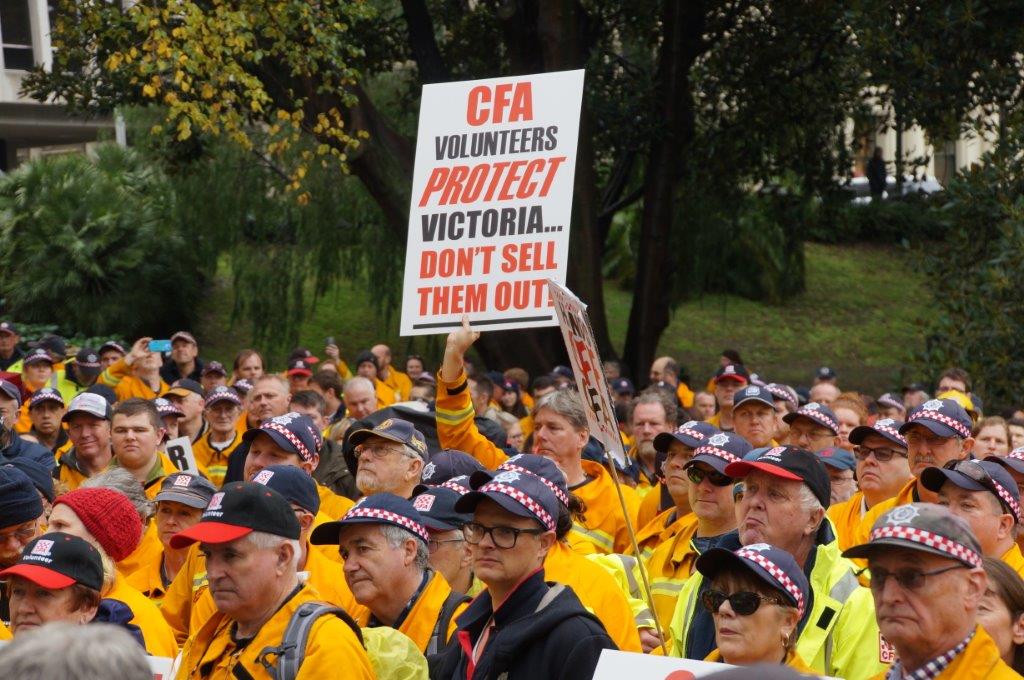
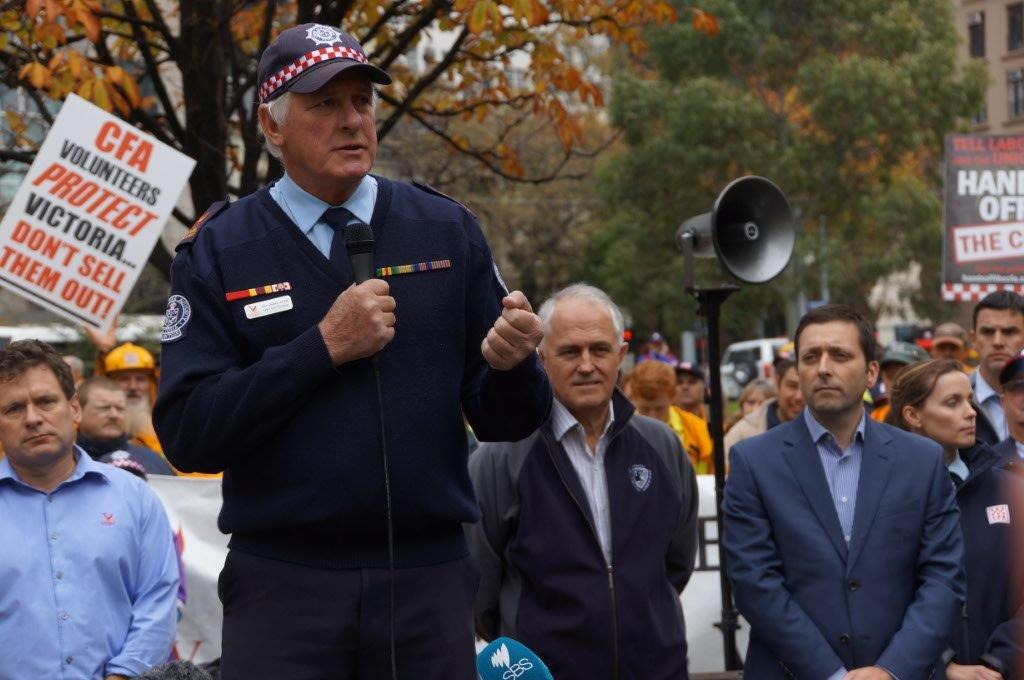
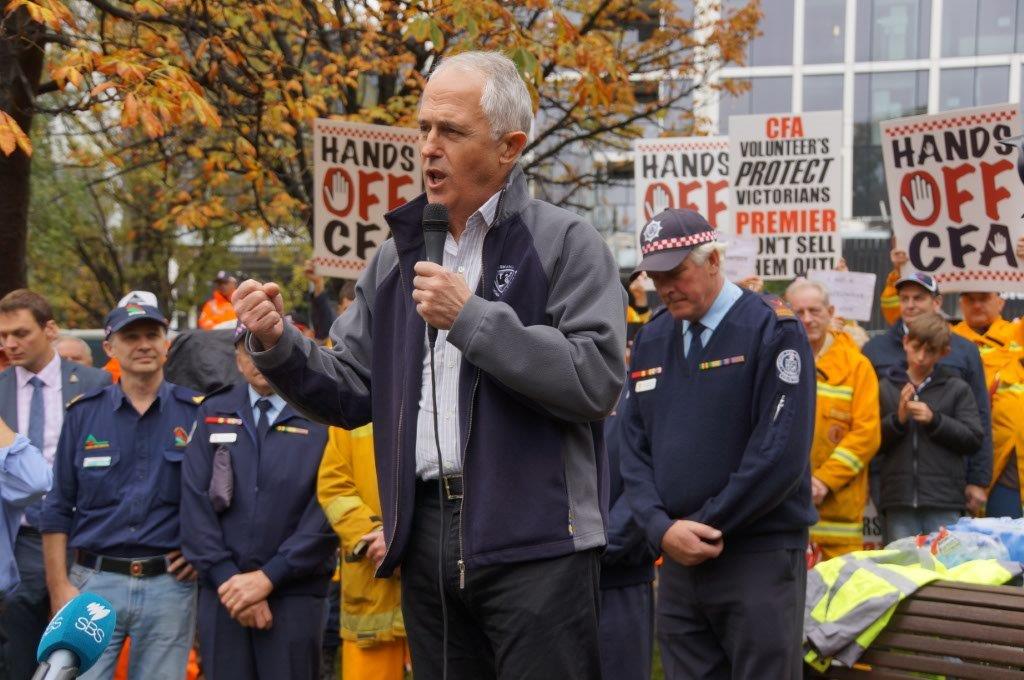
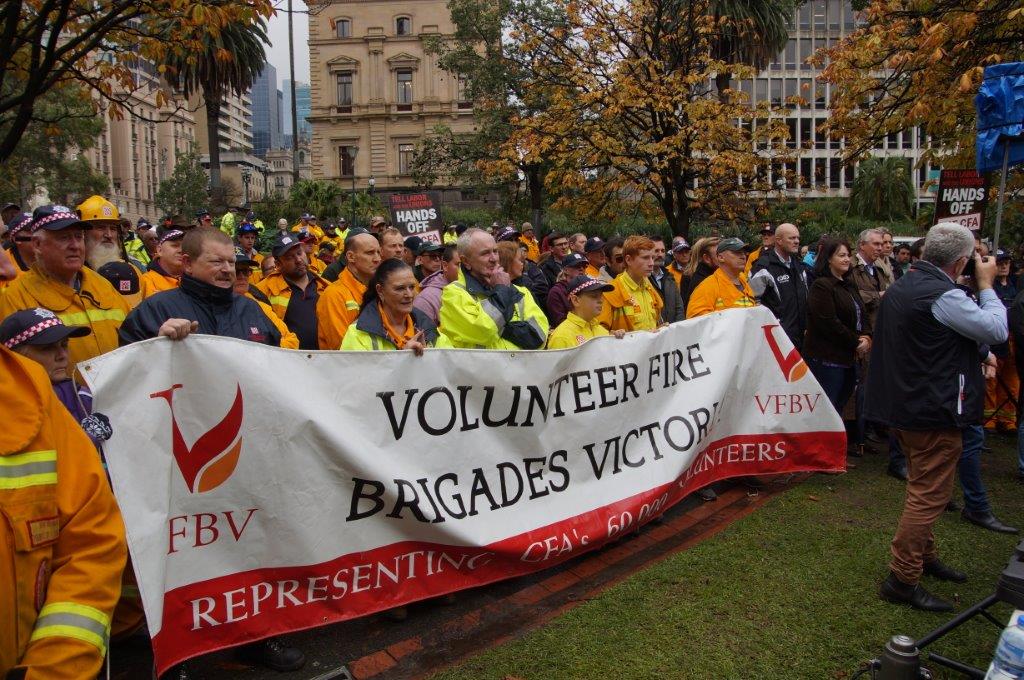
Tier 2 Digital Scanners – payments due 15 May
Have you paid for your Tier 2 Digital Scanners yet?
Brigades/Groups have been emailed Tier 2 Order confirmations and have until the 15 May to pay for their Tier 2 orders.
Need more information? To can find more information on the successful subsidy program and see a generic copy of the confirmation documents click here.
VFBV's FireWise Column - May 2016
IN THIS EDITION
Pictures - 400 CFA Trucks Encircle Parliament during the Motorcade of Support
Editorial - A Matter of CFA's Future and Victoria's Safety
Latest Video - CFA's Volunteer Surge Capacity - see the new computer generated model from VFBV and the University of Melbourne
Stories - VFBV Affiliations Due - National Volunteer Week - VFBV Youth Network - Annual Memorial Service - VFBV Board Vacancies - Digital Scanners - Payments Due
MOTORCADE OF SUPPORT
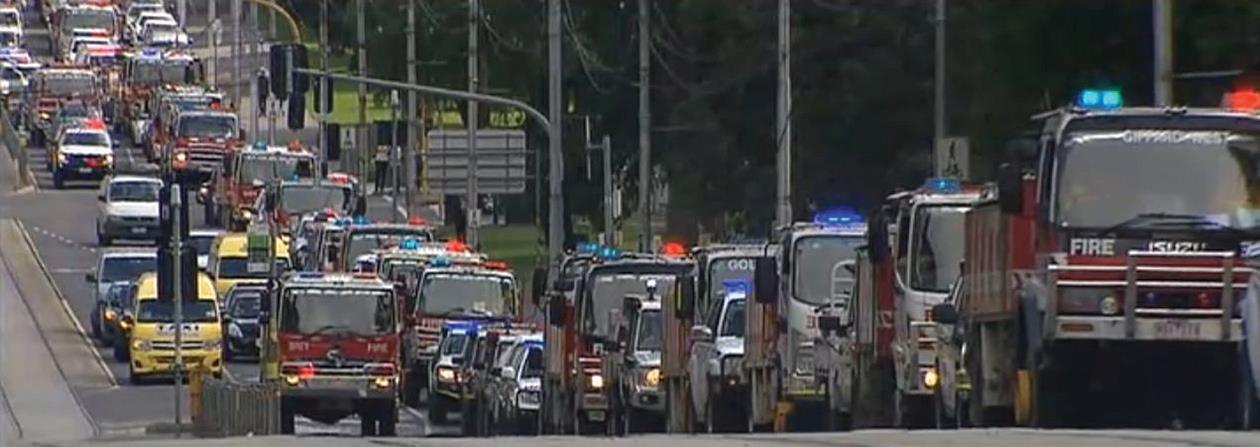
Photo courtesy ABC News
Congratulations to everyone involved in the Volunteer Motorcade of Support for the Minister, CFA Board, CEO and Chief Officer.
We must maintain the dignified approach shown at the motorcade, and we should be proud of the non-political, dignified and respectful way volunteers showed their support for CFA and Minister Jane Garrett’s moral stand to ensure CFA is not sold out.
There were 421 vehicles from hundreds of brigades, with CFA appliances, privately owned fire appliances and support vehicles.
Of great importance were the hundreds of Brigades that registered with their Groups to assist with local coverage and to ensure our communities were protected whilst each District convoy left for Melbourne. Every one of CFA’s 21 Districts was represented, with vehicles from all corners of the state. Crews were professional and disciplined throughout the entire day, ensuring as little inconvenience to the public as possible, and we acknowledge the great support of Victoria Police, the City of Melbourne and the PSO’s from Parliament House.
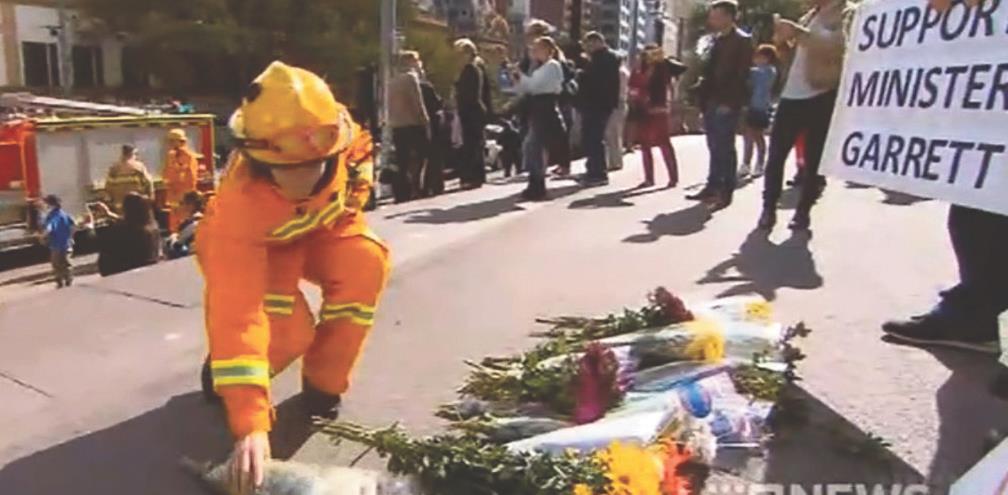
Photo courtesy Nine News
EDITORIAL: A MATTER OF CFA’S FUTURE AND VICTORIA’S SAFETY
By Andrew Ford, VFBV Chief Executive Officer
Over the past few weeks there has been a lot of attention, both publicly and within CFA, regarding concerns for the future of CFA as we know it.
As this copy goes to print, CFA has published an Ops EBA Update that clarifies some of the key facts about the concerns that have underpinned the recent attention.
Certainly there is significant concern amongst volunteers across Victoria, but VFBV and individual volunteers are not the only ones who hold these concerns.
Despite the claims that a very small minority might be peddling, this is not a media beatup, it is a genuine concern held by VFBV, the CFA Board, CEO and Chief Officer, the Minister for Emergency Services Jane Garrett, and - behind closed doors - many other senior officials in the emergency management hierarchy.
The concerns come from the United Firefighters’ Union’s current Enterprise Bargaining Agreement log of claims that include numerous interrelated clauses that seek to; give the UFU control and power of veto over CFA operational and resource decision making; direct how volunteer support is provided in CFA; sideline and diminish the role of volunteers; and dismantle the CFA’s current volunteer and integrated model.
These are real concerns, they drive a wedge between paid staff and volunteers, and to use CFA’s own words, the log of claims is unworkable.
Let me be quite clear, VFBV has no interest in those aspects of the log of claims that relate to CFA career firefighters’ pay.
From the outset our message has been very clear, both publicly and within CFA; give the CFA paid firefighters their 19% increase and settle the pay dispute as quickly as possible.
But we must support the views of those charged with public safety and the safety of the people of Victoria and must support them in their view to not sit by and let control of CFA be handed over to the UFU, not just from our own perspective, but on behalf of the communities we have sworn to protect.
Our motorcade in Melbourne on 23 April was a fantastic show of a united CFA, getting behind the CFA Board, CEO and Chief Officer, and Minister Jane Garrett, who are doing the moral and proper thing of standing firm against the UFU’s attempt to control CFA.
There is a huge amount of detail sitting behind this issue and I don’t have space to go into it here, so I encourage you to read CFA’s latest EBA Update or visit www.vfbv.com.au for more information.
These are very testing times, we all need to show personal leadership and remember the only thing we are driving for is a strong, sustainable CFA, focused on supporting and protecting our communities.
Many people are pondering what the solution might be.
Here are the basics of the solution as I see them, for all of our leaders including those from Government, CFA Board and management, Emergency Management Victoria, the UFU and VFBV.
Commit to working together to achieve an EBA that;
• Cannot override CFA operational and resource decision making
• Does not diminish or interfere with the roles performed by volunteers or the support provided to volunteers
• Does not dismantle CFA’s volunteer based and fully integrated model
• Does not block or reduce CFA and Government’s obligation to consult with volunteers on matters that affect them before decisions are made.
There is now formal advice available to all CFA members, through the CFA EBA Ops Update released on 3 May, that outlines clauses in the current UFU log of claims that go beyond dealing with pay and conditions and work directly in contradiction to the four points listed above.
I have written to CFA requesting that these clauses be considered in light of CFA legislation, the CFA Volunteer Charter and the future of CFA itself.
I ask everyone reading this to remember that this debate is not about volunteers versus paid firefighters.
We all know that volunteers and paid staff generally have great working relationships and we must continue to respect one another.
Before anyone starts judging the other’s argument, anyone in a position to do so should ring the UFU office or CFA for a copy of the latest log of claims and take a look at what is written.
I think you will find very quickly that there is cause for concern and that most CFA members, paid and volunteer alike, will agree that some aspects of the UFU’s log of claims simply go too far.
This is not an issue between volunteers and the UFU, nor is it between VFBV and the UFU; this is an issue about the future of CFA and ensuring that CFA and its Chief Officer can manage the organisation without union interference.
Let’s remember this is a unique situation where volunteers, VFBV, CFA management, the CFA Board and the Minister are all of one view; that the log of claims will give the union too much control over CFA, will dismantle CFA’s integrated model and will diminish and erode the work volunteers do.
The attention that volunteers are bringing to this issue is vital to ensuring a sensible outcome for Victoria.
We should keep this up and escalate it if need be, until the matter is resolved fairly and sensibly.
In the meantime, I say this again; we have absolutely no quarrel with paid firefighters receiving their pay increase, and only wish that matter could be resolved quickly, so we can get on with the work of protecting Victorian communities.
EVIDENCE OF CFA’s VOLUNTEER SURGE CAPACITY
Computer Modelling from VFBV and the University of Melbourne
Following the success of our earlier animated video on volunteer surge capacity, VFBV has been working with the University of Melbourne on a computer-generated time lapse video that graphically demonstrates CFA’s huge volunteer surge capacity.
You can see the computer modelled video on our YouTube channel here.
The video shows incidents and crews responding, and will help educate the public and Government on how CFA Volunteers are essential for Victoria’s Safety and Emergency Services.
We have been building versions for each District, and will shortly distribute copies to your District Councils, for use with the public, decision makers and your own volunteers.
VFBV AFFILIATIONS DUE
Renewal notices for your Brigade/Group’s VFBV Affiliation and Brigade’s VFBV Volunteer Welfare Fund subscription are with your Secretary now, with a due date of 30 June, 2016.
We also strongly encourage Brigades to subscribe to the VFBV Welfare Fund in the interests of supporting your members in times of personal hardship.
For enquiries, contact your State Councillors or call (03) 9886 1141.
NATIONAL VOLUNTEER WEEK
National Volunteer Week is May 9 to 15, and an opportunity to set aside the customary volunteers’ modesty for a moment and accept the thanks of the community.
It is also a chance to thank those who volunteer in supporting roles, and members of the community who help to make your Brigade’s vital work possible.
Volunteer Week is an also opportunity for recruiting and fundraising.
For assistance in engaging local media contact VFBV on (03) 9886 1141.
And we’d like to extend our thanks to every volunteer who takes part at any level, and helps to make VFBV, the voice of the volunteers, such an effective representative organisation.
VFBV YOUTH NETWORK
There has been an overwhelming response to the CFA Multi- Agency Youth Forum to be held on 21 May – the forum will involve St John, Red Cross, SES and Ambulance Victoria as well as CFA, and VFBV will be showcased.
VFBV is hosting the Emergency Management sector Multi- Agency Youth Network, providing the foundation for young people to help us implement other initiatives to engage young people; to consider new ideas and perspectives across the range of issues we deal with, and to shape VFBV, CFA and the Emergency Management Sector into the future.
Our call for Expressions of Interest has gone to all Districts to identify VFBV Champions, experienced CFA volunteers who will support our young people in their work in the Youth Network.
Stay tuned to www.vfbv.com.au for updates, or call Chris Fryer on 03 9886 1141.
ANNUAL MEMORIAL SERVICE
Our Board Members and other senior VFBV officials were among the many volunteers who attended the moving ceremony at this year’s CFA Annual Memorial Service at Wodonga.
The service paid respect to the 67 Victorian firefighters who have died in the line of duty over the years, with this year’s service held in Wodonga to mark the 10th anniversary of the line of duty deaths of Trevor Day, Campbell’s Creek Fire Brigade and Rebecca Helwig from Barnawartha Fire Brigade.
The memorial is held on the Sunday closest to International Firefighters’ Day, known as St Florian’s Day (4 May), and is a formal and reflective day to acknowledge and remember those that have made the ultimate sacrifice on behalf of their communities.
VFBV BOARD VACANCIES
Four positions on the VFBV Board will become vacant this year, and interested volunteers are invited to apply.
The closing date for written applications is Monday, 1 August 2016.
For more details, see the advertisement below, or on page 10 of the May 2016 of edition of FireWise.
DIGITAL SCANNERS PAYMENT DUE
The VESEP-funded subsidy program for digital scanners has now been completed - Brigades are reminded they must pay for their Tier 2 orders by 15 May
For enquiries, call (03) 9886 1141.
THE LATEST NEWS
Get the latest in our email newsletter or VFBV’s popular Two Minute Briefing from the VFBV/CFA Joint Committees - register here.
Join the discussion on our Facebook page at www.facebook.com/cfavolor follow us on Twitter at www.twitter.com/vfbv or on Instagram @volunteer_fire_brigades_vic
Board Members of Volunteer Fire Brigades Victoria (VFBV)
Invitation to apply
Four VFBV Board vacancies – for a 2 year term until 1st October 2018
Closing date for written applications is Monday 1st August 2016
VFBV advances the interests of all Victorian fire brigade volunteers and advocates on their behalf to CFA and other key stakeholders. The VFBV Board drives policy development based on volunteer input and is involved in management of issues of central importance to all CFA volunteers.
Vacancies for Four Board Members will arise when the terms of Nev Jones, Andy Cusack, Bruce Pickett & Bill Maltby expire on 1st October 2016; all members are eligible for re-appointment.
The term of appointment will be for two years and applications are invited from interested volunteers to be considered for these vacancies.
The role of a VFBV Board Member involves contributing to VFBV direction, policy determination and monitoring the performance and governance of the Association. Also actively contributing to policy discussion at Board Meetings, networking with others about policies and issues management, and not only making decisions but being prepared to actively advocate for the benefit of all CFA volunteers and ultimately the Victorian community.
A Board Member Role Statement including the key selection criteria is available from the VFBV office or website www.vfbv.com.au/index.php/about/vfbv/vfbvboard
This is an honorary position; no honorarium is paid.
If you are motivated by the prospect of making a difference for CFA volunteers, then send your written application addressing the key selection criteria in the role statement, plus an outline of your CFA activity including the names of two referees.
Applications must be lodged with VFBV by Monday 1st August 2016.
to: VFBV, P O Box 453, Mt Waverley 3149
Tel: 9886 1141; Fax: 9886 1618
Email: j.laingThis email address is being protected from spambots. You need JavaScript enabled to view it.
VFBV Affiliation and Welfare Fund Subscription Renewals
For the benefit of your Brigade and volunteers
Renewal notices for your Brigade/Group’s VFBV Affiliation and Brigade’s VFBV Volunteer Welfare Fund subscription have been mailed and should be with your Secretary now, with a due date of 30 June, 2016.
The modest cost of $77.50 for VFBV affiliation is the same for all Brigades and Groups, and VFBV’s representation of CFA volunteers continues to win growing approval and support, with a record 94% of Brigades affiliating in 2015/16
By renewing your membership or signing up as a new member you not only demonstrate support for the important work VFBV does on behalf of all CFA volunteers, you also help build the strength of VFBV’s influence, your Brigade or Group will be entitled to participate in VFBV forums and decision making, and your Brigade’s members will be eligible to be supported by VFBV’s Welfare Fund.
We also strongly encourage Brigades to subscribe to the VFBV Welfare Fund in the interests of supporting your members in times of personal hardship. The VFBV Welfare Fund operates under Australian Tax Office rules for charities and is independently audited. It can provide small grants to assist volunteer members, their immediate family members and long servicing ex-members, who are suffering significant financial hardship. Over the past five years, the Welfare Fund has distributed over $550,000 to 170 CFA volunteers in need.
It should be noted that in order to access the VFBV Welfare Fund, your Brigade must be affiliated with VFBV, since the association pays all of the VFBV Welfare Fund’s operating costs. For full details visit the VFBV website www.vfbv.com.au and go to the Member Services area. You can download the VFBV Volunteer Welfare Fund brochure here.
If you would like to speak to someone from VFBV about your affiliation please contact one of your District’s VFBV State Councillors or call the VFBV office on (03) 9886 1141.
AFSM NOMINATIONS FOR 2017
Nominations are open for the Australian Fire Service Medal (AFSM) to be awarded on Australia Day in 2017, so it’s time to think about the long serving volunteers around you, the ones you most admire for their distinguished service.
See below to download the nomination form, nomination guidelines and nominator’s guide.
Nominations must be received by no later than 1 May, 2016.
The Australian Fire Service Medal recognises distinguished service by members of Australian fire services. It is awarded to paid and volunteer members.
All nominations are strictly confidential and the information provided will be used only to assist in considering the merits of the nomination. The person being nominated should not be approached for information or advised of his or her nomination at any stage.
Should you have any questions please contact CFA Awards Secretariat via email to This email address is being protected from spambots. You need JavaScript enabled to view it. or by phone to 1800 232 636.
VFBV Fact Sheet - Government Grants & Assistance
VFBV has prepared this handy Fact Sheet that lists State grants and services for people impacted by bushfires.
The Fact Sheet is intended as an easy reference for Brigades and members helping to support any CFA members or community members who are in need of assistance.
If you are aware of a service or grant that is not included, please This email address is being protected from spambots. You need JavaScript enabled to view it. and we will add it.
Victorian Members of Parliament who have signed the Pledge
Updated 11 March 2016 - Here's a list of Victorian MPs who have signed the pledge to support firefighters with cancer and vote for non-discriminatory presumptive legislation for all Victorian firefighters.
Members of Parliament - If you've signed but are not listed here, or if you would like to sign the pledge, contact VFBV on (03) 9886 1141.
Volunteers - If your local MPs have not yet signed the pledge, see our Presumptive Legislation page to download a copy and see more information on the firefighters' cancer issue.
|
Member (in alphabetical order) |
Electorate |
|
Neil Angus |
Forest Hill |
|
Gary Blackwood |
Narracan |
|
Gippsland East |
|
|
Gembrook |
|
|
South West Coast |
|
|
Hastings |
|
|
Robert Clark |
Box Hill |
|
Peter Crisp |
Mildura |
|
Martin Dixon |
Nepean |
|
Southern Metropolitan |
|
|
Evelyn |
|
|
Bulleen |
|
|
Western Metropolitan |
|
|
Andrew Katos |
South Barwon |
|
Emma Kealy |
Lowan |
|
Northern Victoria |
|
|
Tim McCurdy |
Ovens Valley |
|
Eildon |
|
|
Mornington |
|
|
Morwell |
|
|
Gippsland South |
|
|
Northern Metropolitan |
|
|
Bass |
|
|
John Pesutto |
Hawthorn |
|
Simon Ramsay |
Western Victoria |
|
Dee Ryall |
Ringwood |
|
Steph Ryan |
Euroa |
|
Warrandyte |
|
|
Tim Smith |
Kew |
|
David Southwick |
Caulfield |
|
Ripon |
|
|
Murray Thompson |
Sandringham |
|
Bill Tilley |
Benambra |
|
Heidi Victoria |
Bayswater |
|
Nick Wakeling |
Ferntree Gully |
|
Murray Plains |
|
|
Kim Wells |
Rowville |
|
Mary Wooldridge |
Eastern Metropolitan |
Return to the Presumptive Legislation page
CFA Digital Scanners - ORDERS NOW CLOSED
UPDATE 19 January 2016: ORDERS HAVE NOW CLOSED
ANNOUNCEMENT 16 October: On behalf of CFA and VFBV it is with great pleasure that we announce the availability of CFA’s new Digital Scanners.
*** A copy of this letter and paper order forms have been posted with our October mailout. Digital copies of all forms are attached below. ***
As you are more than likely already aware, CFA and VFBV through the Joint Communications & Technology Committee and CFA’s Business Services Team have been diligently working on a replacement Listening Set since 2010, with the knowledge that as CFA’s radio network transitioned to digital frequencies on the P25 digital network, almost all current analogue listening sets and scanners being used by members would become redundant. Acknowledging the significant expense that new digital capable devices represents to members, and the important role they play in many Brigades, we have been jointly working on not only a replacement scanner, but a subsidization program that would assist members with their replacement.
After an exhaustive tender, trial and selection process, the Uniden UBCD436-PT digital scanner has been selected. This will be amongst one of the first scanners available in Australian that support P25 Phase 2 digital communications, which future proofs the device as Victorian Emergency Services transition to Phase 2 P25 in the future. The scanner is backward compatible, is capable of receiving analogue and current Phase 1 P25 digital radio traffic and will come preprogramed with the current CFA/DELWP radio channel plan.
As this scanner is not currently available via retail channels, and is being manufactured and sold exclusively to CFA members before a public release next year – retail pricing is not yet available, however it is expected to retail within the $500 – $700 per unit range.
In order to provide Brigades with equitable and fair access to these units, CFA and VFBV have developed a subsidy program that will provide all brigades & groups access to a limited number of heavily subsidized units. Through a combination of project funding and a successful joint CFA/VFBV application to the VESEP program, $3 million dollars has been set aside to subsidize units for members. To ensure equitable access to this funding, brigades will have access to a guaranteed minimum of 8 units per brigade at a one off subsidy price of $150 per unit, plus postage and handling, with the subsidy budget picking up the difference. ($296.75) This effectively represents an approximate 70% discount for members. Groups will be provided with a guaranteed minimum of 2 units per group.
The 8 units per brigade, and 2 units per group will be reserved and put aside for brigades/groups to access. You will have 90 days to claim and order/pay for your reserved units at the heavily discounted price, and they will be dispatched as per the attached schedule as orders and payment are received. At the end of 90 days, any units that have not been taken up will then be re-released into the general pool, and will be equally allocated to brigades and groups based on their 2nd Tier pre-orders. If there are any remaining units, these will then be advertised, and made available to individuals on a first in first served basis until all remaining units have been exhausted.
Once the subsidization budget runs out, (expected early 2016) additional units will be made available to individual members at a cost price of $446.75 plus postage and handling.
As these units are being manufactured by Uniden exclusively for CFA, there are long lead times on orders placed with the manufacturer. Units are being received into Australia as they come off the manufacturing line. The first 3,500 units are due to arrive in the country by the 1st November, with a second and third order of units totallying another 2,500 units arriving late December and February. Again, in order to provide all brigades with equitable access to units as quickly as possible, brigades will be able to access their 8 guaranteed units in two batches. The first 3 will be dispatched immediately upon your order and payment being processed, with the remaining 5 being dispatched as soon as subsequent units arrive in the country, and dispatched in the order that orders/payment are received. Group units will be dispatched upon order and payment being processed.
It will be left to the discretion of your brigade/group to determine how the digital scanners will be distributed amongst members, and the brigade/group may determine to purchase the subsidized units from brigade/group funds or request individual members to reimburse the brigade/group for their scanner. During the subsidization program, orders will only be accepted from brigades and groups. As soon as the subsidization program is finished (expected early 2016) scanners will be available for purchase by individual members at cost price.
Payment for the first 8 scanners must accompany your brigade’s order. Cheques and money orders must be made payable to “CFA”. Payment for the first 2 group scanners must also accompany group orders..
If your brigade/group wishes to pay by direct deposit into CFA’s bank account, please indicate where shown on the order form and once your order form has been received, CFA will issue you with an invoice that will contain the direct deposit bank details for you to pay for the order. (If paying this way – you must wait for the invoice to arrive before making payment.)
CFA brigades who are still operating under their own brigade ABN and are registered for GST will need to be processed separately, and will need to wait for a Tax Invoice to be issued by CFA for the total amount payable. If you are unsure if your brigade is still operating under its own ABN, please contact the VFBV office and we can assist with your enquiries. (There are currently only 33 brigades in the state still operating under a brigade ABN – and your brigade secretary/treasurer should know.)
VFBV is providing the administrative support for the processing of orders, and as such all orders should be returned to VFBV for processing. VFBV will process and lodge all orders with CFA within 48 hours of our receiving them. Brigades will be sent an electronic confirmation of your orders lodgement.
Any questions or queries should be directed to the VFBV Office on (03) 9886 1141 or via email to This email address is being protected from spambots. You need JavaScript enabled to view it.
Scanners are not endorsed for operational use, and are no replacement for an official CFA Tait portable/mobile radio. Digital scanners have no send capability, and can only listen in on communications.
This program would not have been possible without CFA’s support and approval, and VFBV wishes to thank CFA for the establishment and support of the subsidization program for the benefit of members.
Download a copy of this letter here
Download a Brigade Order Form here
Download a Group Order Form here
Download a sample Order Form here
Download Scanner Spec Sheet here
Frequently Asked Questions
1. Can we order less than 8 units?
Yes. Brigades are guaranteed to have access to a minimum of 8 subsidized units put aside for them and available up until the 15th January 2016. You can order less than eight, but postage and handling will remain at $35 for any number up to 3 units, and a second postage and handling fee of $45 for any number of units between 4 and 8.
Groups can also order less than their guaranteed 2 units, but again the postage and handling fee will remain at $35 for dispatch of the guaranteed units.
2. How will we know how many subsidized units we can have above our initial allocation of 8? (Tier 2)
We won’t know how many are available until the 25th January 2016. This is to ensure all brigades have equal time to order and pay for their initial allocation. After the closing date of the 15th January – any units not taken up by brigades through the Tier 1 process, will then be made available in the Tier 2 program. We will then divide this total number of units left over by the number of brigades and groups requesting Tier 2 units, and that number will then be allocated proportionally amongst the Tier 2 orders until there are no subsidized units remaining.
On the 25th January, brigades and groups will be advised how many of their Tier 2 orders can be honoured, and payment will then be requested. Brigades and groups will have until the 1st March to pay for these units.
3. Are Tier 2 orders binding?
Yes. Even though you won’t have to pay for these units until we know how many are available, we will have to treat all Tier 2 orders as binding in order to know how many we can allocate to brigades and groups. You should assume that you will be asked to pay for every unit you indicate on the Tier 2 order form.
4. Who will own the units?
This is a brigade/group decision. If the brigade purchases the units using brigade funds, then they will be owned by the brigade/group and can be allocated at the brigade’s or group’s discretion.
Many brigades/groups are likely to request that individual members purchase the units at their own expense, in which case brigades/groups will determine how to prioritize the limited number of subsidized units available, but once the member reimburses the brigade/group for the unit cost, the device will then become the property of that individual.
5. How should we prioritize members if more than 8 members want to pay for a scanner?
This is a brigade decision. The brigade may elect to implement its own ranking system which might prioritize members based on their role within the brigade or group, and what benefit that member’s possession of a digital scanner would have on the brigade.
6. What if a member does not want to order through the brigade/group and just wants to buy one themselves?
Individual members will not have access to units at the subsidized price unless the full allocations to brigades and groups are not taken up. However, individuals will be able to purchase units at the full cost price when they become available. Individual orders will be treated the same as any Tier 3 orders and will be processed only after the end of the subsidization program, which is expected to finish early 2016. The manufacturer will not have any additional capacity until the end of the subsidization program, as it is expected that demand through the subsidization process will deplete all available stock.
Non CFA members will need to wait until the product is released at the retail level, which will be at the manufacturer’s discretion and is unlikely to be until well after CFA’s internal distribution program is completed.
7. Why can only brigades or groups order them?
This scanner has been developed specifically for CFA members and there is a limited budget for how many units can be subsidized by CFA. We are expecting demand to exceed supply, and are therefore relying on brigades and groups to be best placed to determine priority based on benefit to the overall community/brigade/group.
8. Can Headquarters and Coastguard brigades apply?
Yes. All registered CFA brigades and groups may apply. This includes registered Headquarters brigades and registered CFA Coastguard brigades.
9. Can Forest industry brigades apply?
No.
10. Why have groups been provided with a smaller number of guaranteed units?
For two main reasons. The first was to maintain parity and proportion with the units offered to brigades when considering membership/role numbers. The second reason being that groups received a priority allocation well above brigade allocations in the allocation of CFA Tait radios during CFA’s radio replacement project. On average, each group in the state received an allocation of 10 CFA Tait radios for use by group personnel.
11. Why will only 3 units be dispatched straight away?
These units are being manufactured exclusively for CFA. It currently takes 120 days from when CFA places an order, and when that unit is then available in the country. 3 units per brigade has been determined by how many are in the country and are available now, with additional units being dispatched as they come off the manufacturing line.
12. I own a small business. Can I purchase these units for re-sale?
No. These units are only available exclusively for CFA members until early 2016.
These units are likely to be offered to the public through the manufacturer’s normal wholesale and retail channels at some point in the future, but is unlikely to occur before the end of CFA’s distribution program. Any decision to offer the unit to the public will be solely at the discretion of the manufacturer.

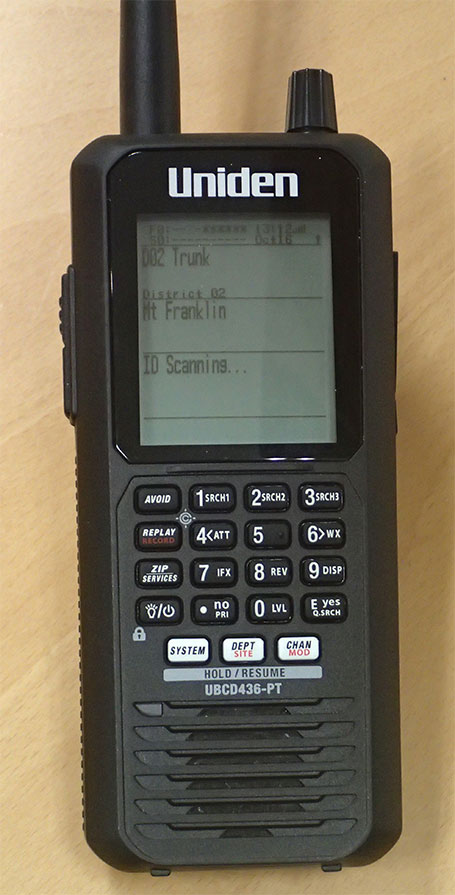
Fire Services Review - 18 December Update
UPDATE: Click here for the 18 December Message to Volunteers
VFBV FINAL SUBMISSION VFBV's LETTER TO MPs
VFBV INITIAL SUBMISSION VFBV NOTES FOR VOLUNTEERS
WATCH THIS SPACE - The Review's final report and the Government's response have been postponed until after the bushfire season - both are likely to have important ramifications for volunteers everywhere and Brigades should be ready to study them as soon as they become available.
Click on the list below to see VFBV's submission and supporting documents - if you have made submission to the Review and would like to make it available on this page, contact us at This email address is being protected from spambots. You need JavaScript enabled to view it.
What is the Fire Services Review?
The Review was set up as a comprehensive review of MFB and CFA – a serious issue for volunteers - and the review was run on a very short time frame.
See the State Government media release here and the Review’s Terms of Reference here. See below for what VFBV had to say on some of the issues.
VFBV's Final Submission to the Fire Services Review
VFBV's Initial Submission - Dated 14 August 2015
- The Cover Letter to VFBV's Initial Submission
- What we told the 2009 Victorian Bushfires Royal Commission
- VFBV's submission on the 2009 proposal for the amalgamation of the fire services
- The Jones Report, and the Appendices to the Jones Report
- What VFBV told the Jones Jones Inquiry
- The 2014 VFBV Volunteer Welfare & Efficiency Survey report
- The Victorian Auditor General's report on the management of emergency services volunteers
- VFBV's media release explained our views on the VAGO Report.
- The 2008 Lewis Report looked into the selection of new Personal Protective Clothing (PPC) for firefighters.
- The Victorian Government Green Paper on the Emergency Services
- VFBV's submission on the Green Paper
Fire Services Review - Latest Update
Click here to hear ABC774’s on air forum on the Fire Services Review, with Emergency Management Commissioner Craig Lapsley, VFBV’s Andrew Ford and the United Firefighters’ Union’s Peter Marshall. The forum went to air on Thursday, 7 April, on Jon Faine’s Conversation Hour.
VFBV Chief Executive Officer Andrew Ford’s Note to Members on the Government’s Response to the Fire Services Review’s recommendations
The Government has now released the Fire Services Review report and probably more importantly the State Government’s response to the report’s recommendations.
Both of these documents are available for download below and also from the Fire Services Review website. The Fire Services Review website includes copies of all public submissions including VFBV, CFA and EMV submissions.
I think most CFA volunteers will be pleased overall with the Government’s response to the review. A key theme throughout the review is a recognition of the enormous front line and collective capacity of Victoria’s fire services. There is a very strong theme of needing to ensure there is a culture and collective respect of the skills, knowledge and professionalism of Victorian firefighters, volunteer and paid staff alike, regardless of pay status. The report calls to improve leadership and to address a concerning culture that has tolerated; treating people differently based on pay status; bullying and harassment; poor front line worker and management relationships; and a ‘them and us’ approach.
There is a strong call for everyone in the sector to focus more energy on working as one. There is strong recognition of the need for CFA to have more flexibility in the way it deploys resources to support local brigades and community circumstances, and there is an identified need to improve leadership from agency executive level through to Brigade level and across the sector’s collective leadership.
The review recognises the strengths of the existing fire services and says that effort should be focussed on ensuring the separate fire services share common effort, reduce duplication and work as one. The report explicitly advises against any contemplation of amalgamating the MFB and CFA, reporting that this would have a negative rather than constructive impact.
The report acknowledges the extensive and essential capacity of CFA’s volunteer Brigades and the fundamental value of sustaining and building strong integration in those communities where paid staff are required to supplement volunteer capacity. The report identifies the essential nature of CFA’s volunteer Brigade surge capacity for major and concurrent events.
There are 20 recommendations, and the Government has identified an action to address 18 of these. Several recommendations are earmarked for further discussion/work and the Government has committed to work with VFBV and others on the detail of these.
Based on some commonly discussed issues during the review, many volunteers will be particularly interested in the following recommendations and government response;
- Recommendation 9, concerning consideration of a Firefighters’ Registration Board – Government response is to initiate national consultation on this over the next five years. The report detail suggests this would need to be open to volunteers and paid firefighters alike and would provide an opportunity to facilitate lateral entry and recognise skills, irrespective of whether they are paid or volunteer.
- Recommendation 18, concerning deploying Leading Firefighters or Station Officers to provide administrative, technical, community engagement and operational support to volunteer Brigades. The Government has supported the intent of finding ways to support volunteer Brigades, but has noted the best means to deliver that support requires further consideration.
- Recommendation 17, includes recommendation that CFA review the process for selecting Brigade Captains. Government response suggests a selection process be developed to enhance the current approach to focus on ensuring the necessary leadership and technical skills needed for the role. This work has a timeframe of the next two years.
- Recommendation 5, includes developing best practice models for initiation and planning for the establishment of integrated Brigades and the selection of leaders of integrated Brigades, drawing on successful processes adopted to date. Government response is that CFA is to lead a short review to identify best practices.
- There are also recommendations concerning training; health & wellbeing; developing leadership; and better engagement with volunteers and representative bodies.
VFBV will seek to be very closely involved with work on these and the actions proposed for all other recommendations.
Of interest is an acknowledgement to include VFBV on EMV’s Fire Services Interoperability Committee. This is consistent with VFBV’s previous requests to EMC Craig Lapsley and also an issue covered in our submission to the review. VFBV has previously expressed dissatisfaction to the EMC about not being included in this important forum.
There are several recommendations relating to culture in the fire services and issues specifically relating to bullying and harassment. VFBV has already welcomed the CFA-commissioned Equity and Diversity Review being conducted by VEOHRC.
At a more strategic level, there are recommendations involving consideration of possible future service delivery models, a review of CFA and MFB legislation, and a review of the legislation giving powers to EMV, but no specific direction set down as yet. VFBV will certainly be taking a keen interest to ensure these important issues progress in a positive way.
See below to download a copy of VFBV’s media release supporting the Government's response, the Fire Services Review report and the Government’s response.
VFBV has supported the Government’s response to the Fire Services Review and commended Minister Garrett for taking the time to make a sensible and considered response. We have also welcomed the invitation to work with Government on the issues requiring further consideration. Over all, our reaction to the Government’s response to the review’s recommendations is positive and I believe this provides a good foundation for us to work constructively with Government and the CFA. I have said publicly, as you will see in our media release, that in the main the Government’s response to the Fire Services Review is on the mark, and for the issues requiring more work, VFBV looks forward to working with Government, the agencies and other stakeholders.
Andrew Ford
Chief Executive Officer
VFBV's submission to the Fire Services Review
Volunteer Fire Brigades Victoria (VFBV) lodged a detailed 48 page submission with the State Government’s Fire Services Review, with considerable contributions from VFBV Delegates and individual volunteers. It was lodged alongside many more submissions from District Councils, Brigades and volunteers.
Our submission drew upon the work we have done on 11 other inquiries and reviews since 2008, including data from the annual VFBV Volunteer Welfare and Efficiency Survey and issues already being raised through VFBV’s extensive consultative networks.
Volunteers noted the Minister’s statements at the time of the announcement of the Review, that an amalgamation of CFA and MFB “is not on the Government’s agenda” and that “Victoria’s fire services and their boundaries will remain intact”.
The covering letter from VFBV and VFBV’s submission to the Review raised a number of issues familiar to volunteers, and there was a detailed summary in the accompanying VFBV Notes for Volunteers – all three documents are available for download below.
VFBV Survey Attracts Record Numbers
More than 2,500 volunteers have taken the 2015 VFBV Volunteer Welfare & Efficiency Survey and the new VICSES version of the survey this year.
Volunteers’ responses are being studied for the survey report, which will go to VFBV and CFA Boards, CFA’s senior management, VICSES, the Emergency Management Commissioner and the Minister for Emergency Services.
You can see the 2014 report at www.vfbv.com.au
Each year’s results are compared with previous years' figures to show trends in how volunteers feel on each issue.
It is a co-operative process; VFBV and the CFA Board studied the first three years' results and continue to use the survey to highlight aspects of volunteer support that need attention.
The annual survey is making your association’s representation more effective and giving every volunteer the chance to be heard.
You can sign up for the 2016 survey by sending your name, Brigade/Unit and District or Region to This email address is being protected from spambots. You need JavaScript enabled to view it. or request a posted survey on paper by calling (03) 9886 1141.
CFA Volunteers welcome State Government VESEP grants
VFBV MEDIA RELEASE Thursday, 13 August 2015
The CFA volunteers’ association says 202 CFA Brigades are about to get great news about brand new fire trucks and equipment from this year’s Volunteer Emergency Services Equipment Program (VESEP).
Volunteer Fire Brigades Victoria (VFBV) CEO Andrew Ford said news of the successful grants was announced this morning by the Minister for Emergency Services, the Hon Jane Garrett MLA.
“VESEP is a great program, this year over 200 CFA Brigades across the state will receive a share of $7.1 million in funding,” Mr Ford said.
“In addition, there was $1.9 million approved for other initiatives including funding for cold climate gear designed for volunteers attending callouts like road accidents and searches in inclement weather, where the CFA volunteers’ familiar yellow overalls don’t provide sufficient protection from the rain or cold,” he said.
“VESEP is really popular with CFA volunteers; we helped to design it, so it is low on paperwork and lets the Brigade pick from a list of trucks, equipment and fire station improvements that they can put to work for their local community”.
“The grants reward the countless hours volunteers spend in their communities raising funds for life saving equipment, and match local fundraising two for one, so a Brigade can apply for anything from a few hundred dollars for a chainsaw to $100,000 for a fire truck or specialist vehicle,” he said.
“The Brigade can choose a vehicle, operational gear, training equipment or a building project that suits their fundraising capacity and serves the local community’s needs,” Mr Ford said.
VESEP grants fund a wide range of useful projects and gear for CFA Brigades, including;
- Operational gear, such as chainsaws, pumps and generators,
- Vehicles and appliances, such as Field Command Vehicles, fire trucks and rescue trucks, and
- Improvements to fire stations, such as refurbishments like training and meeting rooms.
The $12 million VESEP program is also open to local volunteer groups from organisations including the Australian Volunteer Coast Guard (AVCG), Life Saving Victoria (LSV), Victoria State Emergency Service (VICSES).
“VESEP is a good example of how involving front line volunteers from the design stage of a program can make it a success that adds to the ability of local Brigades and other emergency units to protect the community,” Mr Ford said.
VFBV urges local Brigades to think about a VESEP application for next year, and provides useful tips and case studies in the VFBV VESEP Application Support Toolkit available online at www.vfbv.com.au to help with local Brigades’ applications.
CFA Brigades protect 60% of suburban Melbourne, regional cities and all of country Victoria, every day and night of the year.
NOTE TO BRIGADES - Considering applying for a VESEP grant in a future funding round? Click here for VFBV's useful tips and case studies from past successful applications to show you how it's done.
Australian Fire Service Medal (AFSM) nominations
Think about the volunteers you look up to; the volunteers you admire the most. The ones who have given distinguished service to CFA, volunteers and the community.
The Australian Fire Services Medal is worthy recognition for those special volunteers, and reflects well on their Brigade and all CFA volunteers.
CFA is now gathering nominations for the Australian Fire Service Medal (AFSM) for the Queen’s Birthday Honours 2016.
Nominations must be in by 1 November 2015.
All volunteers, auxiliary members and full-time staff of CFA are eligible for the medal. The Australian Fire Service Medal is not reserved for senior officers – it is open to all levels of CFA.
The sole criterion for the award of the Australian Fire Service Medal is distinguished service.
“Distinguished service” includes service that is above and beyond the normal zealous and faithful discharge of normal or ordinary service, whether short term or prolonged. It could be a special achievement or success in the performance of duty in difficult or unusual circumstances, or sustained high-level performance with outcomes and recognisable benefits to CFA, the fire service in general or the community. The service must be exceptional. Long service should not be used as a basis for making nominations.
See below to download the AFSM Nomination Form, the Nominator’s Guide and the Nomination Guidelines.
2015 VFBV Volunteer Welfare & Efficiency Survey
Click here to take The 2015 VFBV Volunteer Welfare & Efficiency Survey
Click here to learn more about the annual survey
Talk to other volunteers in your Brigade about taking part - More participants means greater influence for the survey results when we take them to CFA, the Emergency Management Commissioner and the State Government.
The survey is open until 31 August 2015.
You can see the 2014 results by clicking here
This year, VICSES volunteers have their own survey, hosted by VFBV on behalf of VESA – VICSES volunteers can click here to take part or find out more here.
Fiskville Inquiry - Interim Report Released
Just released: The Interim Report from the Parliamentary Inquiry into the CFA Training College at Fiskville is available for download below
NOTES FROM THE STATE COUNCIL DISCUSSION BEFORE VFBV’S PRESENTATION TO THE PARLIAMENTARY INQUIRY ON 15 JUNE 2015
The Victorian Parliament’s Inquiry into the CFA Training College at Fiskville has the potential to affect far more than the future of the Fiskville site.
VFBV has provided a written submission and more than an hour of evidence and we have been invited to provide additional information in a second written submission.
The issues to be presented to the Parliamentary Committee were workshopped at the VFBV State Council on 13 June. The State Council determined that the key points to be presented to the Inquiry hearing were;
The safety of our members and support to any members who have been exposed in the past is paramount and should remain the primary concern.
The Committee must ensure the focus remains on safety of our members and support to any members, whether exposed in the past during training or at fire incidents, or members who may be exposed in the future.
Firefighters, paid and volunteer alike, need access to the best possible training and the most real-to-life training. If Fiskville operations are to be closed for rectification works, scaled back or ceased altogether, then the resulting gap in Victoria’s training capacity must be fixed immediately.
If this requires funding for improvements, alternative interim training facilities, or new facilities, then this must not only be a recommendation of the Committee it must also be backed by a firm funding commitment from all sides of politics.
Just as being safe whilst training is paramount, there is a huge risk to firefighters when they are confronted with real life situations if they haven’t had access to appropriate real-to-life training.
The Inquiry process must work to establish a level of confidence amongst firefighters, the community, the Government and the firefighters’ representatives, about the facts. There has been a lot of discussion of what is or isn’t safe, and what can or can’t be fixed. Our members need the Committee to ensure the facts are on the table, that the opinions and assessments of the independent experts are known, and the analysis, decisions and regime going forward are transparent and beyond partiality or self-interest groups.
Having spoken with volunteers across Victoria, we believe it is of utmost importance that the Inquiry must unbundle the issues;
- Past versus present
- Which problems have ceased or been fixed
- Which current problems can be fixed
- Which current problems require further solutions or warrant cessation of use
- If there is a need for cessation of use;
o Is it for all uses
o Is it forever
o Is it until the results of the remaining independent expert examination
Decisions about the future must also represent a sensible use of public money; funds already invested in the site, money that must be spent regardless of whether Fiskville continues to operate or not, and the cost of new facilities or new water treatment regimes. Compromising safety is unacceptable; compromising access to training is unacceptable; and any waste of scarce funding is likely to be met with equally severe criticism.
The importance of the real-to-life training undertaken at Fiskville over the years cannot be overstated; not just hot fire training but the full range of state level and specialised skills in incident management, incident leadership, operational decision making and real-to-life operational exercises.
Much of this requires multi-day and live in courses. The live-in experience and relationship building experiences are fundamental to the preparation required for firefighters to battle major emergencies.
Also of vital importance is access; the availability of training at a time and place, and in a format that suits members. We must fill the gap in local and state level training capacity left by any cessation at Fiskville, including in the interim until permanent solutions can be put in place. And while there is discussion of fixing Fiskville, we must also stress the importance of investment in training not just at Fiskville but at all CFA training facilities, and in the context of growing demand in future.
It is important that the Fiskville Inquiry gives careful consideration to the feasibility and cost effectiveness of all options, with no compromise on safety.
From the beginning, volunteers have asked for expert, independent, transparent and accountable analysis of decisions, and the Parliamentary Committee’s Fiskville Inquiry gives us the opportunity to ensure decisions, messages and treatment are based on facts, established independently by experts, in a properly transparent process.
It is also important that the Parliamentary Committee gives our members clarity, based on expert and independent analysis and facts, about the issues surrounding PFCs, PFOS and what is necessary to ensure safe water quality standards.
It is important to set clear standards and gain the support of Government and sufficient funding to establish this level of treatment and controls to ensure the cost of training, just as it shouldn’t jeopardise the safety of trainees, doesn’t jeopardise the accessibility of state of the art training. This may require a link to the full site audit currently underway before any final decisions – particularly any decisions along the lines of a permanent closure of Fiskville.
Fiskville is, of course, just a part of the big picture on training and maintaining the skills of our volunteer-based CFA and of ensuring the safety and wellbeing of its members, both paid and volunteer, and VFBV is alarmed at the continued delay in the introduction of presumptive cancer compensation legislation for Victoria’s firefighters.
Moving forward, we need;
- Independent assurance of safety, based on facts
- Informed decisions on any options for rehabilitating, fixing and reopening Fiskville
- Protection of firefighters, not just during training
- Empowerment and support to CFA to address training based on need, not capped artificially based on budget
- Removing the rumour, speculation and uncertainty, and making decisions on independent, expert analysis of the facts
Ends….
2015 Volunteer Welfare & Efficiency Survey - Open Now
The 2015 Volunteer Welfare & Efficiency Surveyis now open until 31 August - to complete the survey now click here.
The Victorian Emergency Service Association (VESA) invites all VICSES volunteers to take part in a volunteer-run survey that will better equip your association to advise VICSES and Government on what’s most important to volunteers.
The survey as designed and road tested with emergency management volunteers, so it gets straight to the point on issues that matter to the people on the front line. The survey includes 33 questions on those issues, and takes 10 to 15 minutes to complete. Each question asks how important the issue is to you, and how well you feel it is being handled by VICSES.
Why a volunteer survey?
This annual survey began with the CFA volunteers’ association, Volunteer Fire Brigades Victoria (VFBV) three years ago, and VFBV is how hosting the VICSES volunteers’ version on behalf of VESA.
The results will be compared year to year, to show trends in how volunteers feel on each of the issues. It is a co-operative process; VFBV and the CFA Board both study the CFA volunteers’ version to highlight aspects of volunteer support that need attention. VESA will put our survey to the same use, providing reliable facts and figures to support the association’s representation of all VICSES volunteers.
Your individual answers will be confidential, but the overall results will go straight to the decision makers.
The survey is designed to identify the factors that volunteers feel have a key impact on their welfare and efficiency, to establish ways of measuring whether things are getting better or worse, and to develop a process that uses these measures to ensure better support for VICSES volunteers and Units.
Open to all VICSES volunteers
This survey is making our representation more effective and making sure every volunteer’s voice has the chance to be heard, whether you and your Unit are actively involved with VESA or not.
Last year’s survey drew more than 1,600 responses.
The survey will give VESA facts and figures we can use in working for the benefit of volunteers, Units and the communities they protect, so we urge all VICSES volunteers to take part.
To complete the survey now, click here.
If you would prefer a paper survey sent by post, contact This email address is being protected from spambots. You need JavaScript enabled to view it. or email the VESA Secretary at This email address is being protected from spambots. You need JavaScript enabled to view it.. The survey will remain open until 31 August 2015.
Emergency Management Volunteer Statement - Have Your Say
Note from VFBV CEO Andrew Ford:
The Emergency Management Commissioner, with in-principle support from the Minister and Premier, has released a draft Emergency Management Volunteer Statement for consideration and feedback from VFBV and volunteers.
The VFBV Board and CEO were invited to provide comments on an initial draft and are happy to report that essentially all of our early feedback has been incorporated into this current draft.
CFA volunteers already place a high value on the existing CFA Volunteer Charter and legislative backing that supports it. The draft Emergency Management Volunteer Statement wording and the formal commitment from Craig Lapsley as Emergency Management Commissioner, and on behalf of the Government as Chair of the Minister’s Volunteer Consultative Forum, has confirmed that the intent of the Emergency Management Volunteer Statement is to strengthen and complement the existing CFA Volunteer Charter, which will continue as an enduring commitment between Government, CFA and VFBV on behalf of CFA volunteers.
As VFBV Chief Executive Officer, my broad view is that the draft Emergency Management Volunteer Statement is a positive and reinforcing commitment by the Victorian Government and Emergency Management Sector to consult and engage with volunteers in emergency management on matters that affect them.
VFBV has been requested to provide further feedback and ideally endorsement of the Statement before 17 July 2015. I think this Emergency Management Volunteer Statement is a positive initiative and invite your comment and/or suggestions for refinement, prior to VFBV providing final advice to the EM Commissioner on 17 July.
Andrew Ford
Chief Executive Officer
Click here for the draft Emergency Management Volunteer Statement and the online feedback form.
CFA Volunteer Strategy Endorsed
The CFA Volunteer Strategy has now been endorsed by the CFA Board, and the VFBV/CFA Joint Volunteerism Committee encourages you to read it (see below to download a copy).
The Strategy lays foundations for how everyone in CFA will work towards ensuring the future capability of community based volunteer emergency services remains strong, whilst encouraging, maintaining and strengthening the capacity of volunteers to deliver CFA services.
VFBV has renewed its request for CFA to prepare an implementation strategy, and Joint Committee delegates have emphasised the importance of using the Chief Officer’s Chain of Command to inform and deliver the implementation down to the District level. CFA has advised work on implementation plans is progressing, with plans due to be signed off by June 30. The Strategy is available for download below.
Emergency Management Commissioner's Tribute to Volunteers
Emergency Management Commissioner Craig Lapsley has posted his National Volunteer Week video tribute to emergency volunteers on YouTube – you can see it here.
There are close to 100,000 emergency volunteers in Victoria, including 60,000 CFA volunteers.
Here are some CFA volunteer facts and figures:
- There are nearly 60,000 CFA volunteers in more than 1,200 Brigades statewide
- Emergency volunteering is a professional field, with volunteers trained to nationally recognised standards, and CFA Brigades protecting 60% of suburban Melbourne, regional cities and country Victoria, every day and night of the year
- CFA Brigades deal with all manner of emergencies all year round, including house fires, industrial fires, road accidents, floods, chemical spills and rescues, as well as the bushfires of summer
- There are approximately 10,000 CFA volunteers in the outer suburbs of Melbourne
- The CFA’s volunteer firefighters are emergency services professionals with nationally recognised qualifications, working to the same response standards as paid firefighters
- There are also thousands of non-operational CFA volunteers, performing vital support roles, handling equipment maintenance, fundraising, administration and community education
- CFA volunteers are more than 90% of the state’s fire fighting force and 97% of CFA. The great capacity of the volunteer system allows CFA Brigades to provide thousands of trained, experienced firefighters to combat bushfires and other emergencies such as floods, while still providing round-the-clock protection to their own communities
- CFA Brigades protect 3.3 million Victorians and one million dwellings every day and night of the year.
VFBV Welfare & Efficiency Survey 2015 - Open Now
The survey is now open until 31 August - to take part now, click here.
Volunteer Fire Brigades Victoria (VFBV) invites all CFA volunteers to take part in a volunteer-run survey that will better equip your association to advise the CFA Board and State Government on what’s most important to volunteers.
We designed and road tested the VFBV Volunteer Welfare & Efficiency Survey with volunteers, so it gets straight to the point on issues that matter to the people on the front line. The survey includes 33 questions and takes 10 to 15 minutes to complete. Each question asks how important the issue is to you, and how well you feel it is being handled by CFA.
Why a fourth survey?
This year’s survey results will be compared with the first three years' figures, to show trends in how volunteers feel on each of the issues. It is a co-operative process; VFBV and the CFA Board both studied the first three years' results and will continue to use the survey to highlight aspects of volunteer support that need attention. Your individual answers will be confidential, but the overall results will go straight to the decision makers.
The survey is an important step forward in volunteer representation. VFBV is established under the CFA Act to represent volunteers on all matters that affect their welfare and efficiency, and the VFBV Board commissioned this project to identify the factors that volunteers feel have a key impact on their welfare and efficiency, to establish ways of measuring whether things are getting better or worse, and to develop a process that uses these measures to ensure better support for volunteers and Brigades. By repeating the survey periodically, VFBV can track trends in volunteers’ opinions.
Open to all CFA volunteers
Most Brigades are affiliated with VFBV, its officials are CFA volunteers and VFBV represents volunteers in dealings with CFA, the State Government and Opposition, and official inquiries, on everything from routine equipment and procedures to the future of the emergency services as a whole. This survey is making our representation more effective and making sure every volunteer’s voice has the chance to be heard, whether you and your Brigade are directly involved with VFBV or not.
Last year’s survey drew more than 1,600 responses.
The survey will give VFBV facts and figures we can use in working for the benefit of volunteers, Brigades and the communities they protect, so we urge all CFA volunteers to take part.
To take part in the survey, click here.
2014 VFBV Volunteer Welfare & Efficiency Survey
The report on the 2014 VFBV Volunteer Welfare and Efficiency Survey is now available - you can read it online here or download it below.
We encourage volunteers to read the report, and to register for the 2015 survey now (see below, the survey starts in July).
This annual survey looks at trends in volunteer opinion, and would not have been possible without the more than 1,600 CFA volunteers who took part in 2014.
The survey began in 2012 and is put to work as a productive tool by both VFBV and CFA. This year’s results once again confirm some strong trends that are clear pointers to paths for improvement by CFA.
VFBV will soon run several Drill Down Workshops with groups of volunteers, looking at the outcomes, the causes and possible courses of action. To add your comments, talk to your District’s VFBV Delegates or call Cliff Overton at the VFBV office on (03) 9886 1141.
Please encourage your Brigade members to sign up for the 2015 survey - send your name, district and email address to This email address is being protected from spambots. You need JavaScript enabled to view it. and you will receive an invitation by email. Call (03) 9886 1141 if you require a printed copy of the survey by regular mail.
You can read the full report on the 2014 survey here or download a PDF copy below.
You can sign up for the 2015 survey here.
2014 VFBV Volunteer Survey - Volunteer Satisfaction
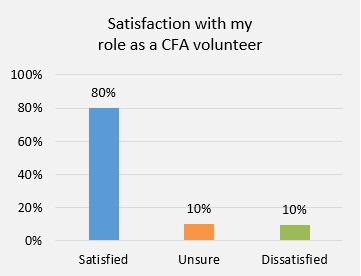
Survey respondents are asked to rate their satisfaction with their role with CFA, the way they are treated by CFA, their intentions to remain a CFA volunteer and their likelihood to recommend being a CFA volunteer to others.
The 2014 survey results across the four satisfaction questions are highly aligned to the 2013 results. 80% of respondents are satisfied with their role in CFA in 2013 and 2014, whilst there is a 2% shift in 2014 from ‘unsure’ to ‘dissatisfied’.
A 2% shift in 2014 from ‘dissatisfied’ to ‘satisfied’ has increased volunteer satisfaction with the way they are treated by CFA from 57% to 59%.
Satisfaction levels with the way volunteers’ rate their treatment by CFA shows the greatest improvement across all satisfaction measures – with a 5% increase in satisfaction from 2012 to 2014.
The ‘intention to continue my role with CFA’ results are identical for 2013 and 2014.
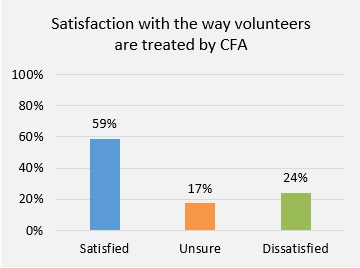
A 1% change in the 2013 and 2014 results for the satisfaction statement ‘I would recommend being a CFA volunteer to people I know’ sees the yes score increase to 81%.
As stated previously, the comparatively low satisfaction score with the way volunteers feel they are treated by CFA suggests that the greatest potential impact on future volunteer welfare and efficiency sits with CFA in the success or otherwise, of their partnerships with volunteer brigades.
In addition to the broader satisfaction questions, survey results against each statement for the past three years can be compiled to observe trends in active satisfaction and active dissatisfaction.
Survey results suggest that whilst volunteers continue to be most satisfied with the support and encouragement they receive at local brigade level, they remain actively dissatisfied with CFA’s performance in relation to consultation at a District, Regional and Corporate level.
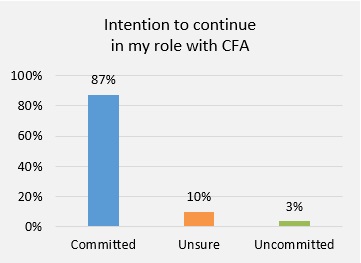
Eleven survey statements scored satisfaction levels markedly higher than the rest of the survey. The same statements have also scored consistently higher for the past three years and in most cases, have shown an improvement in satisfaction levels over that time. These statements relate to the range of factors that contribute to a welcoming and rewarding local brigade environment, that is supportive of volunteers and operating well at a local brigade level.
One statement “volunteers are effectively consulted and involved in decision making at CFA Corporate level” scored dissatisfaction (37%) higher than satisfaction (21%) as well as achieving the lowest satisfaction rating. The same statement scores the second largest gap in survey results and demonstrates an ongoing need for improved consultation between volunteers and Corporate CFA.
Two other statements scored dissatisfaction levels just below satisfaction, consistently over the past three years.
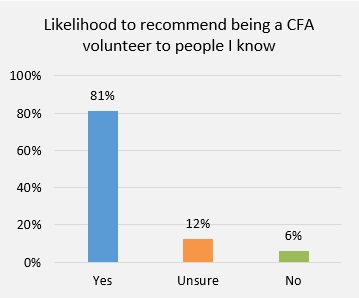
Both statements also relate to CFA policies, practices and workforce arrangements that integrate volunteers and paid staff and the impact these have on volunteer consultation and cooperation.
These results suggest there is an ongoing need for improved effort by CFA to build an effective volunteer-based organisation, in which volunteers are supported by employees in a fully integrated manner.
Given this is a fundamental obligation of CFA as described in the CFA Act, this is an area warranting close attention.
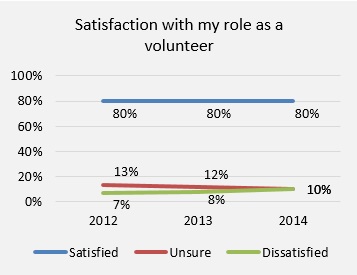
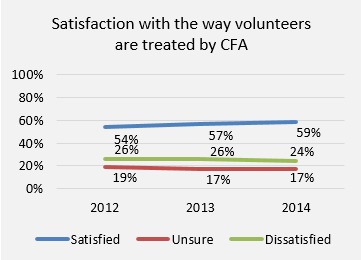
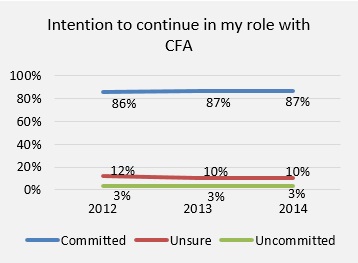
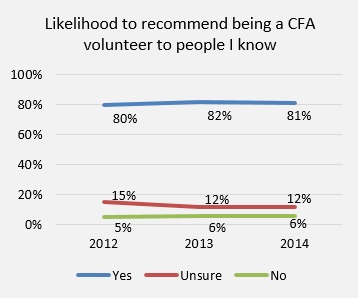
2014 VFBV Volunteer Survey - Demographic Variations
Survey respondents provide information that identifies their age, gender, length of time as a volunteer with CFA and brigade type. This information is collated and used to provide material for further analysis.
Gender
In 2014, 86% of survey respondents were male, and 14% female. This is an under representation of the total CFA female volunteer membership, as CFA data indicates that 20% of CFA volunteers are female. The promotion of future surveys to encourage an increased female representation closer to the total membership percentage would benefit the results.
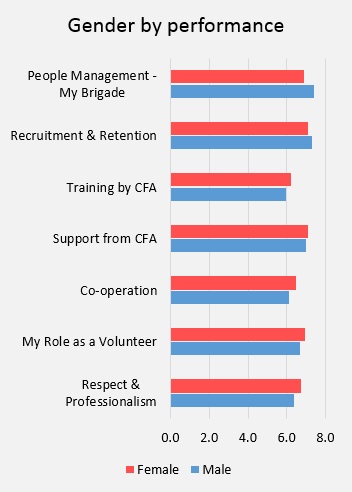

Female survey respondents rated ‘people management – my brigade’ and ‘recruitment and retention’ performance lower than male respondents across the seven themes.
The differences occur when the questions relate to CFA’s performance in conflict resolution, bullying and harassment, in which case, females rate the management of such issues lower than males.
The most telling survey response was in response to the statement “there are no barriers to the roles women can occupy in my brigade”. Females feel that importance and more so performance against this statement are lower than their male counterparts, therefore female respondents see a greater gap.
Nine other survey statements relating to recruitment, retention and brigade behaviour were tested against gender responses; none of the tested statements showed a gender influenced 1.0 gap difference in the above statement. No other statement showed more than 0.5 in gap difference when compared across gender.
More than one third (37%) of survey respondents were in the 40-54 age cohort, which is reflective of the 2010 volunteer participation rate by age as illustrated in the Victorian Auditor General Office 2014 audit Managing Emergency Services Volunteers (p.2).
Survey results broken down by the age range of the volunteer against performance scores show that the overall satisfaction in CFA and brigade is highest in the +65 age group. This may relate to a broader point in life where such views are possibly held on most issues.
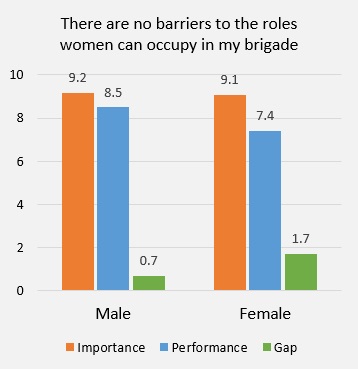
The second highest age range to rank CFA highly is the under 25 year old group, this may relate to length of service and a sense of optimism and future reward within CFA.
Age.
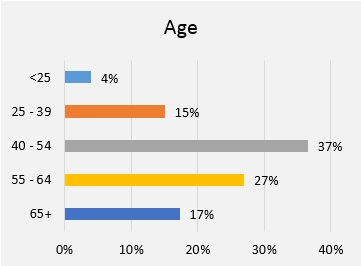
More than one third (37%) of survey respondents were in the 40-54 age cohort, which is reflective of the 2010 volunteer participation rate by age as illustrated in the Victorian Auditor General Office 2014 audit Managing Emergency Services Volunteers
Survey results broken down by the age range of the volunteer against performance scores show that the overall satisfaction in CFA and brigade is highest in the +65 age group. This may relate to a broader point in life where such views are possibly held on most issues.
The second highest age range to rank CFA highly is the under 25 year old group, this may relate to length of service and a sense of optimism and future reward within CFA.
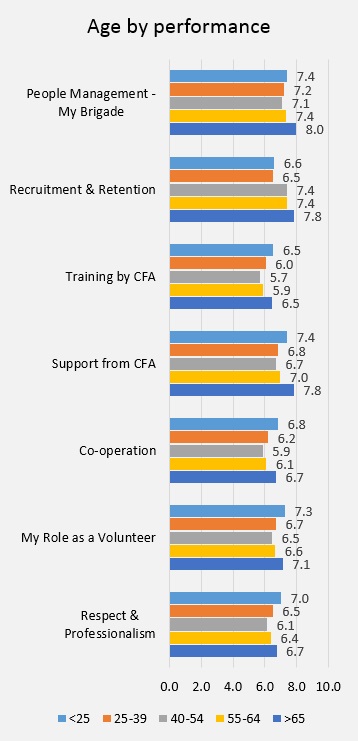
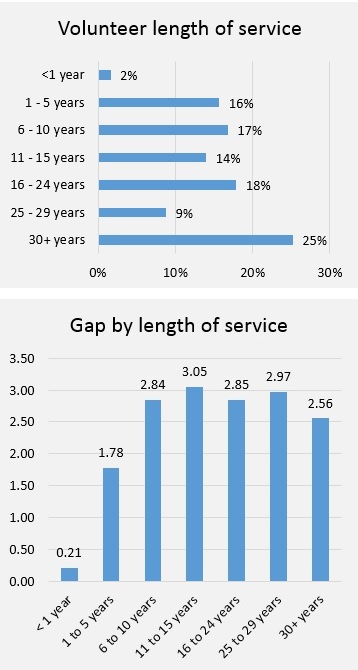
Length of service as a volunteer.
One quarter of survey respondents have spent more than 25 years as a CFA volunteer, the largest length of service group in the survey, whilst 2% had spent less than one year in CFA as a volunteer and 16% less than five years.
Survey results for gap scores were tested against respondents’ age range to see if trends could be identified.
Volunteer length of service created a distinct pattern across the question responses. Volunteers who have served with CFA for less than one year are the most positive about the organisation and their brigade on nearly every question.
Two distinct increases in the gap between importance and performance occur; firstly in respondents with more than one years’ service and then again in volunteers with more than five years’ service. The gap sharply increases after their first year of service, i.e. their level of satisfaction drops sharply after one year and then again after more than five years’ service
Length of service related positivity then begins to reduce the gap back up to the 30+ years’ service mark.
Brigade service/risk environment.
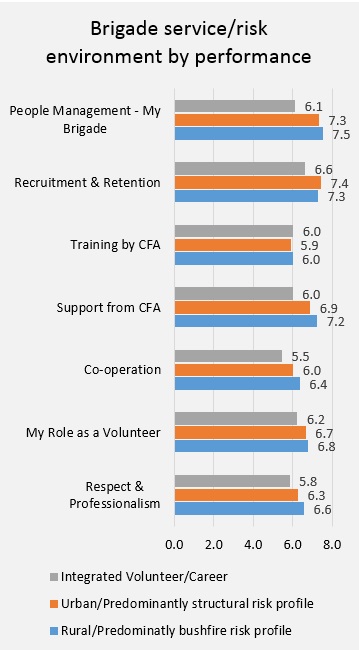
Volunteer membership of four types of brigade service/risk environment could be nominated by the survey respondents, these being;
- Rural/predominantly bushfire risk profile.
- Urban/predominantly structural risk profile.
- Integrated volunteer/career.
- Coast guard brigade.
Only one survey response was received from a coast guard brigade member, therefore this response has little impact on the brigade service environment analysis.
The integrated volunteer/career survey responses consistently scored lower on importance and more so on performance. Integrated brigades scored poorly on performance in relation to workplace bullying, conflict resolution, volunteer consultation, morale and supporting new volunteers. These particular statistical results point to ongoing issues within integrated brigades that require specific attention.
When the nominated brigade service/risk environment responses are tested against performance scores for the survey themes, the results generally show (for five of the seven themes) that brigades with a predominantly rural/bushfire risk rate CFA performance more highly and integrated volunteer/career brigade rate CFA performance the lowest. The only two variations in this trend are where all three brigade service/risk environments rate training performance very closely (6.0, 5.9 and 6.0) and where urban/predominantly structural risk brigades rate recruitment and retention performance higher.
The most marked variation in performance scores between brigade service/risk environments is in the ‘people management – my brigade’ theme where volunteers in integrated volunteer/career brigades rated performance 1.2 below urban/structural risk and 1.4 below rural/bushfire risk types.
The survey performance scores by brigade service/risk environment are reflected in some of the written survey comments, where volunteers feel that the treatment they receive and the relationship they have with career staff are not as good as they should be.
The survey results suggest that further work in understanding the specific issues facing integrated volunteer/career brigades is required in order to improve working relationships between CFA volunteers and CFA career staff.
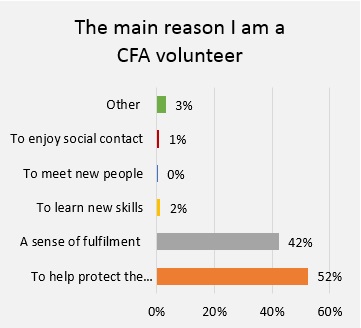
Reason for being a volunteer.
Survey respondents are asked to select their main reason for being a CFA volunteer from six listed options.
Slightly more than half the survey respondents (52%) nominated “to help protect the community I live in” as their main reason, whilst a considerable proportion (42%) nominated “a sense of fulfilment in supporting my community in a meaningful way” as their main reason.
These results are highly aligned to the 2013 survey results, where 50% of respondents nominated “to help protect the community I live in” as their main reason and 44% nominated “a sense of fulfilment in supporting my community in a meaningful way”.
The other four options for both the 2013 and 2014 survey results rated very low by comparison, (4% combined in 2013 and 6% combined in 2014).
When compared to satisfaction levels against the statement “I would recommend being a CFA volunteer to people I know” these results suggest that volunteers play an important part in recruitment, as they are highly motivated by their volunteer experience and keen to see others enjoy the same experience.
Awareness of VFBV.
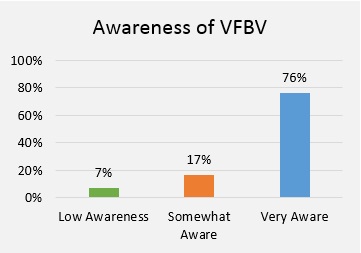
The number of respondents with reasonably high awareness of VFBV had grown from 71% to 76% compared to last year. There are still many volunteers with either low or only moderate awareness of VFBV, so this is an area for continued attention.
The comments received suggest that many volunteers feel a low awareness of VFBV or being aware of the VFBV overall but not feeling a good enough understanding of what VFBV does. Also, how processes work or how they easily access information on particular issues.
Consistent with previous years there is a diverse spectrum of comments regarding whether VFBV should be more forthright in representing volunteers through to some thinking VFBV is too assertive. Comments describing a tension between pursuing a fair go for volunteers and maintaining harmony, particularly regarding issues where CFA workforce culture, arrangements and industrial agreements impact on areas that also directly affect volunteers.
There are also a mix of comments regarding how VFBV should work as a close partner with CFA and Government versus VFBV needing to be more independent and more publically critical of policy and direction that is not good for volunteers.
Comments reinforce the desire of volunteers to have a grass roots connected, well organised, well-resourced volunteer voice but at the same time a strong concern that the funding of such a voice must not erode VFBV’s independence and objectivity.
There are many comments recognising improvements in VFBV engagement and visibility amongst volunteers and also many comments asking VFBV to communicate achievements more broadly and increase the profile of VFBV at brigade level.
A number of comments express a frustration that VFBV is not vocal enough in the public and media debate complaining of the absence of a strong CFA leadership voice. VFBV needs to do more to educate the community about the importance of CFA volunteers and to defend the reputation of volunteers, when it is put down by interest groups with particular agendas.
2014 VFBV Volunteer Survey - People Management - My Brigade


The 2014 survey scores for importance against specific statements in the ‘people management – my brigade’ theme scored equal highest against statement scores across the survey.
The statement “Workplace bullying is not tolerated in the brigades that I have been a member of” scored 9.2 for importance in the 2014 survey, consistent with the score of 9.3 received in 2013. The statement “the environment at my brigade is volunteer friendly, welcoming to new members and creates good morale” scored 9.1 for importance in the 2014 and 2013 surveys.
These scores are supported by written comments received from respondents that relate to their own brigades, with comments relating to a high level of importance amongst volunteers for a safe and welcoming brigade environment, free of bullying or other forms of harassment.
In the written comments, there is a common and substantial concern raised about bullying and harassment, and the poor level of response and support for resolving conflict when it does occur.
One interpretation of the spread and the tone of the commentary could be that when things are going well there is generally a high degree of satisfaction.
However, when there are problems in particular brigades or locations, these have a specific impact on the people involved and are generally not managed as well as they should be.
The comments are consistent with written survey responses to statement fourteen, suggesting that some brigades need more support in this area.
Comments also suggest that there are ‘cliques’, instances of ‘them and us’, ‘clubs’ and other cultural elements that negatively impact on volunteers generally as well as impacting on teamwork and the effective utilisation of many willing volunteers.
There are several comments suggesting conflict situations, problem individuals (both paid and volunteer) and problem cultural elements are not dealt with as quickly as they should be.
There is also a concerning trend suggesting that people are discouraged from speaking out and a repeating concern that officers responsible for dealing with conflict are not objective. A theme recurring through many responses is the need for better leadership development and a more effective process for dealing with conflict resolution that includes a safeguard against subjectivity (described as favouritism by some).
The commentary suggests that when things are working well (which is the predominant assessment across the survey) service as a CFA volunteer is reasonably comfortable, but when conflict escalates, the current approach does not cope as well as volunteers expect it to, leaving issues to escalate and cause long term impacts.
Some of the comments suggest a desire for CFA leadership and support staff to take a more active role when conflict resolution is required. Several comments seek a mechanism whereby VFBV or some other independent organisation can ensure reasonable protocols are in place and that appropriate support is provided to individuals in conflict or bullying situations.
Survey performance scores have dropped slightly from 2013, resulting in a gap score of 1.7. This theme is one of only two to see an increase in gap from 2013 to 2014 (respect and professionalism being the other theme with an increased gap).
West and South West Regions have lower gap scores than other Regions. Further analysis of the factors influencing these results may reveal more valuable information.
2014 VFBV Volunteer Survey - Recruitment and Retention


2014 survey result scores for importance in this theme produced the equal highest score for a single statement, that being “there are no barriers to the roles women can occupy in my brigade”, scoring 9.2. This is consistent with the same statement scoring the highest performance score in 2013 (9.3) and demonstrates how highly survey respondents value diversity within their brigades.
Following closely behind this score in the same theme is the statement “people from all cultural backgrounds, different religious, political and personal beliefs are all made welcome at my brigade”, which scored 9.1 on importance and 8.2 on performance.
The recruitment and retention theme received a comparatively small number of written comments as compared to other themes.
Of the negative comments received, there were several around CFA’s need to improve the respect for and treatment of females and that there are still pockets of unacceptable behaviour towards females. These comments support the high importance placed on gender equity in the survey scores.
There were comments acknowledging CFA’s ability to recruit, including younger members and people from more diverse backgrounds and roles however, a frustration exists in that training can be difficult to access or not matched to an individual’s progression in CFA, resulting in keen volunteers not staying or not being utilised.
The most common underlying factor present across most of the negative comments, is a frustration with CFA training, which leads to a negative force jeopardising volunteer retention. Ongoing issues with the difficulties associated with getting onto courses, the flexibility in recognising prior learning beyond the prescriptive CFA training and poor course organisation, were all mentioned.
Some comments expressed an opinion that the culture within CFA paid personnel is not volunteer focussed, and that an ‘us and them’ attitude dominates. One response suggests that CFA needs to incorporate a performance measure relating to volunteer training and retention into CFA staff performance, particularly for staff at integrated brigades.
Other comments suggest that CFA’s senior volunteers should have a stronger focus on mentoring new members. Some comments reflected on the personal experience members had over years of service with CFA and their desire to see future generations benefit from the experience.
2014 survey result scores for importance and performance in the ‘recruitment and retention’ theme produced the smallest gap across all seven survey themes. A gradual increase in performance against a consistent importance score over the past three years has continued to decrease the gap. The gap between importance and performance scores across all five Regions varies only slightly (0.3), and are the closest gap scores Region by Region for the seven survey themes.
2014 VFBV Volunteer Survey - Training by CFA


Within this theme, survey responses for the statement “CFA provides enough training opportunities in formats, at times and at locations that make it easy for me to participate” have generated the largest gap for the 2014 survey, consistent with having the second largest gap in 2013.
This same statement also received the lowest performance score for any survey statement in 2014 and second lowest score in 2013. The respondents scoring against this statement clearly indicates an ongoing dissatisfaction with the current level of service received from CFA in respect to training.
While written comments for other themes in the survey are brief and sometimes quite individual, the commentary for ‘training by CFA’ is detailed and focussed on common recurring concerns.
These recurring comments refer to a lack of training availability and opportunity, with negative comments on the frequency and timing of courses. Some comments refer to unsuitable training formats and a lack of access to specific training requirements outside of the standard operational training packages, such as leadership training and conflict resolution training.
Written comments also refer to the time taken between attaining qualification and receiving the personal protective equipment required to turn out, once qualified.
Survey responses express this as creating a frustration in volunteers who have made time available to train but are then unable to utilise their training and support their brigade.
These written comments in the training theme are reflective of responses under other themes relating to sense of worth, recognition and treatment of volunteers.
Of the written comments received, few were positive. One of the positive comments reflected an appreciation of the size of the training tasks in CFA and suggested that volunteers and brigades could be more proactive in identifying solutions.
An improvement in performance scores against a stable importance score has seen the gap decrease over the past three years. The biggest influence underpinning this improvement is in the area of leadership training for volunteers, people management and conflict resolution and mentoring.
The difference between gap scores Region by Region for this theme are greater than any other.
South West Region’s positive performance and markedly smaller gap in relation to training may warrant further investigation to determine what is contributing to the success.
2014 VFBV Volunteer Survey - Support from CFA
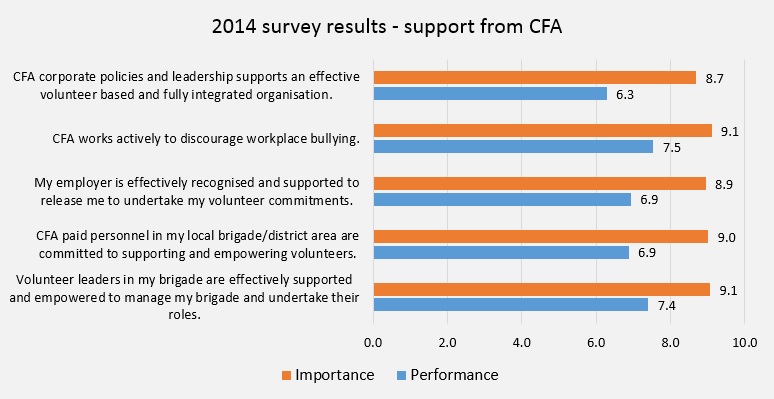

This theme, more than any other, has generated survey responses relating to specific brigade or individual member issues. Issues raised, include the lack of CFA support for the resolution of management issues at brigade level, a high level of CFA staff turnover at Region and District level impacting on support to brigades and budget cuts impacting on resources for volunteers.
Survey comments for this theme are consistent with previous themes in relation to perceived differences in the level of support provided by CFA to paid and volunteer members, and the general feeling that CFA volunteers are being treated as ‘second class’.
Other notable survey respondent comments include a desire to see more CFA staff working in support of brigades rather than in CFA headquarters on projects, a concern regarding the lack of training for volunteers in administrative roles, and a number of comments that CFA is too focussed on the metropolitan area and not providing sufficient support to regional Victoria brigades.
Whilst performance has improved over the past three years (6.4 to 7.0) resulting in a smaller gap, importance has remained consistently high, reinforcing the fact that support from CFA remains a high priority for volunteers.
The gap improvement from 2.5 to 2.0 is driven by improved performance across all statements within the themes. Statement performance scores all improved between 0.2 and 0.7 in 2014 as compared to the 2013 results.
The statement “CFA paid personnel in my local brigade/district area are committed to supporting and empowering volunteers” improved in performance score by 0.7 from 2013 to 2014 – the equal highest statement performance improvement in the 2014 survey.
There are minor variations in the Region scores as compared to other themes. As previously discussed in the Cooperation theme observations for Regions, further analysis of the factors influencing these results may reveal more valuable information.
2014 VFBV Volunteer Survey - Cooperation


Within the Cooperation theme, the poorest performing aspect relates to how volunteers feel about the way they are consulted and involved in decision making at the CFA corporate level.
Despite improvements in the performances scores for all four statements in this theme in 2014, scores for this theme are generally low for both 2013 and 2014 results as compared to the rest of the survey.
The statement “volunteers are effectively consulted and involved in decision making at CFA Corporate level” had the lowest performance score of the survey in 2013 and created the largest gap, however the gap score against this statement has improved. In 2014 this statement ranked second lowest in performance scores and had the second largest gap score, therefore is still an issue of concern for volunteers and should be an equal issue of concern for CFA.
It is important to note however, this aspect also shows the best improvement since the 2012 survey, indicating that whilst volunteers still feel there is a lot more to be done – things are improving.
The survey results confirm volunteers place a high value on being consulted and involved in decision making at all levels of CFA and expect CFA to perform well in this area. Volunteers’ place a very high importance on all CFA people (volunteer and paid staff at all organisational levels) working cooperatively towards shared goals.
The written survey responses in this theme discuss issues relating to perceptions of volunteer poor treatment and lack of respect from paid CFA staff. A common theme is about CFA staff attitude to volunteers on integrated stations, and in some cases the conduct of Operations Officers in the field. Negative comments are also made in regard to CFA management’s lack of connection with volunteers.
Some survey responses also refer to an established ‘them and us’ culture amongst CFA paid staff and volunteers, manifesting in the service and treatment of paid staff at major incidents as compared to volunteers.
A significant improvement in the performance score over the past three years has seen the gap reduce from 3.2 to 2.5. This improvement is mainly influenced by the decrease in the 2014 gap scores for the statements “volunteers are effectively consulted and involved in decision making at CFA corporate level” and “CFA’s workforce arrangements allow the paid staff and volunteers to work cooperatively as a team”.
Survey result variations between Regions show West and North East Region gap scoring less than the other Regions, it would be insightful to explore the factors or initiatives underpinning this result.
2014 VFBV Volunteer Survey - My Role as a Volunteer


For 2014, the largest individual survey question gaps for this theme appear against the statements “CFA recognises and utilises the skills and experience that I bring to CFA” and “CFA proactively provide opportunities for me to progress and develop my skills to more senior/diverse roles as part of an individual volunteer career pathway”.
This is consistent with the survey results generally poor performance in the survey questions relating to CFA training (see Training by CFA).
The survey comments are along similar themes to respect and professionalism, with a focus on low levels of support to volunteers, the desire for recognition and appreciation, and comments on poor treatment by CFA paid staff.
The increasing non-operational workload for volunteers continues to be an issue, with a number of survey responses citing the increasingly unsustainable workload around meeting attendance and participation in CFA projects.
These comments include statements that volunteer activity outside the traditional response activity, is not adequately recognised and supported by CFA.
Survey comments indicate that undertaking strike team activity as an emergency response and then spending considerable time on scene waiting to be tasked, continues to frustrate volunteers who then feel, that the limited time they have available to volunteer, is not being effectively used by CFA.
In some cases, these comments are followed by a statement that the problems are repeated year after year and if not fixed, the volunteer will not attend strike teams in the future and only support local brigade call outs.
Some of the positive comments relating to this theme were that respondents enjoy being a volunteer member of CFA and state, how joining a volunteer brigade ‘was the best thing they ever did’. These positive comments cover both male and female respondents and include statements from both new and long serving members.
The 2014 survey results indicate that volunteers think CFA could do better with regard to recognition of the skills and experience volunteers bring to CFA. The results also suggest volunteers believe that CFA could improve its efforts in developing volunteer skills and providing individual volunteer pathways across the diverse roles required in CFA.
Overall performance in this theme has improved slightly over the past three years. Respondents indicate that the statements listed in the survey are growing in importance and pleasingly also reported a sense that things have improved since the 2012 survey.
As discussed in Respect and Professionalism, initial Regional variations in the former eight Region model showed variation between outer metropolitan Regions and other Regions.
Regional gap variations across the theme are similar in range to the previous theme, with gaps ranging from 1.9 to 2.1 in the more urbanised Regions as compared to 1.6 to 1.7 in the less urbanised Regions.
2014 VFBV Volunteer Survey - Respect and Professionalism

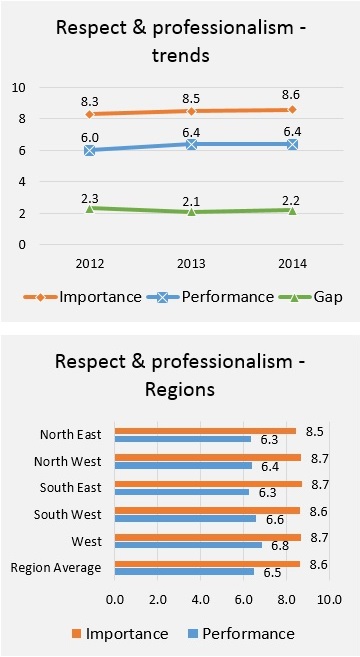
The 2014 survey results for this theme are reasonably consistent with previous years, a notable trend however, is that the respondents feel the issues underpinning respect and recognition of their professionalism are even more important than previous surveys.
Survey results within this theme indicate CFA performing strongest in the statement ‘CFA consistently and proactively promotes the public understanding of community confidence in the role and professionalism of CFA volunteers and their brigades’ and conversely, poorest in the statement ‘the respect and value of the contribution of volunteers is evident in CFA’s actions and culture’.
The majority of the comments on respect and professionalism were about how volunteers feel they are being treated within CFA. A number of negative comments referred to being treated as ‘second class’ by CFA organisationally, when compared to the way CFA manage and support their paid operational staff.
This is also expressed in the way volunteers see themselves treated as ‘second class’ by CFA operational staff in the field. The comments express a frustration with an established culture amongst some CFA paid staff, in the way they treat volunteers.
Specific major incidents were mentioned in the negative comments as examples of where volunteers felt they were not treated with respect, provided the same regard as paid staff to contribute to the event response or given the same level of support as that received by paid staff.
Importance has increased steadily over the past three years, with an initial improvement in performance from 2012 to 2013 then remaining the same for 2014. This has resulted in a marginal gap increase in 2014.
The 2014 survey data was collected against the eight former CFA Regions, and when tabulated by those Regions, it showed significant differences in survey results between the former three ‘Outer Metropolitan’ Regions (Eastern, Northern and Western Metro and South East Metro) and the five other Regions.
When reallocated against the new CFA five Region model, the survey result differences become less apparent as they are ‘absorbed’ into the new Regions’ geographic coverage.
Regional variation should be of concern to CFA, given that the more urbanised areas can generate a higher CFA service demand. Volunteers are generally managing higher activity levels and certainly requiring highest possible levels of volunteer motivation, satisfaction and a feeling their volunteer skills and experience are utilised optimally and their capacity and professionalism is respected and welcome.

































